

Wednesday, January 18, 2023
Free social stories about homework, study skills, & tests.
The other day it occurred to me that my kids probably don't really know how to study for a test simply because no one has specifically taught them or shown them how.
Well, that and there hasn't really been a reason to really study for them yet. But as my oldest approaches high school, this skill set will become more important.
So, quite recently we talked about different ways to study. I showed my kids some different ways they could review their notes and how they could test their knowledge themselves in little ways. That kind of thing.
But I thought it would be helpful to look for some free social stories about homework, study skills, and taking a test to supplement as needed. And in case someone else might be in the same boat, trying to help their kids learn how to study.
Below you will find a variety of social stories about taking tests, what homework is, cheating and plagiarism, taking notes, writing a research paper or essay, and more. Hopefully you find these helpful!

Free Social Stories About Homework, Study Skills, & Tests
Have you been looking for a social story about doing homework or a social story about test anxiety? Then look no further than these free printable study skills social stories. Some require you to have a Teachers Pay Teachers account (which is free!) before you can download them.
I've rounded up some options for you to explore. That way you find the best homework related social story for yourself or your child. Or you can simply use ideas from different stories below to write your own custom story (free social story templates here to help).
Please note that just because a social story is listed here does not mean I endorse its content. After all, many social stories tend to be poorly written and/or teach autistic masking. Besides, I haven't read all of these stories word for word myself. So please read through the stories carefully before using them.
1. 4 Homework Social Stories from Happy Learners - There are four text-only social stories here about doing homework. No images are included with these stories. The topics include what is homework, why you have to do homework, finding a routine for doing school work at home, and how to keep track of assignments and their due dates.
2. Social Story About Taking Tests at School from Social Stories: Power Tool for Autism - This story includes two clipart images. Otherwise, it's primarily text only. It talks about some test taking rules.
3. Cheating Social Story from Watson Institute - There are lots of stories here, but scroll down until you find the cheating one. It talks about test taking, asking for help, and what cheating is. It uses colorful clipart.
4. Social Stories for Tests & Homework from Watson Institute - There are a number of stories here. One topic that I'm glad to see here is "Sometimes Kids Don't Get 100%" as I know many kids struggle with that.
5. Completing School Work & Assignments Social Stories from Watson Institute - You'll find lots of relevant stories here. Topics include: completing assignments, completing school work, how to start work by myself, and completing work independently.
6. Doing Homework Social Story from Meghan Brice on TPT - This story comes as a PowerPoint so you should be able to edit it. It uses a mix of photos and clipart.
7. Taking a Test Social Story from Mathnolia on TPT - This story looks like it does a good job of explaining what a test is and the different types of tests a child might encounter. It appears to use primarily clipart.
8. Social Story About Taking Exams from Centre for Autism Middletown - Scroll to the bottom and you'll find a one page social story about taking exams. It includes one photo.
9. Avoiding Plagiarism Checklist from Laura Torres on TPT - Okay, it's not technically a social story. However, it's a great checklist for helping kids avoid plagiarism. It would be a great visual to have handy while doing homework or research papers.
Video Social Stories About Study Skills, Note Taking, & More
Here are some video social stories that talk about different aspects of homework, taking tests, and other relevant study skills. You can use these in teletherapy sessions, social skills groups, at home, and/or classroom settings. Videos are always a great alternative to printing off a story.
Like the stories above, some of the wording in these videos aren't always great. But I wanted to make sure you had lots of different options for helping yourself or your child understand different aspects of study skills and completing homework. Remember, many of these videos are geared towards different age groups.
I was surprised by how many free social stories about homework (and related study skills!) are actually out there. Hopefully you'll find one or two that will be useful for your needs.

Need one-on-one support? I can help!
Quick links, get connected, where i write.
Home > Special Education & Autism Resources > Social Stories > Social Stories for Tests & Homework
Social Stories for Tests & Homework

An integral part of a student’s education is ensuring comprehension of the subjects being taught. This is reinforced through the assignment of homework, and comprehension is assessed through exams and testing.
Exams can be nerve wracking for students but there are ways you can help your child or students prepare. Using a behavior story can help you to set expectations for your child and help them understand the what and why of a situation!
Standardized tests may have their own unique set of rules and expectations for students. Some tests may have time limits, or have different sections that need to be completed in a specific order.
If you are helping your student prepare for a standardized test, be sure to make your behavior social story as specific as possible. Use your student’s special interest areas (such as favorite cartoon characters) to reinforce potential scenarios and the appropriate responses to them.
Learn more about using behavior social stories to prepare your students for exams and to reinforce the importance of homework!
The special education resources on this page were authored by Watson Institute’s Lisa Plastino, M.Ed., special education consultant .
These behavior social stories may benefit your students. They can be downloaded, saved and edited to suit your needs. The * notation indicates the story is formatted in a Power Point presentation and the ** notation indicates a Power Point with sound narration. Each Power Point has animation included on each slide. Some occur automatically – some occur on a “click”. Feel free to send comments or questions to [email protected] .
Sometimes Kids Don’t Get 100%
Sometimes Kids Don’t Get 100% – Longer Version
Taking Tests
PSSA Tests *
Princesses Do Their Homework
Responsibilities
Taking the PSSAs
Taking the MAP Test
If you have questions or concerns about the Watson Institute’s use of this information, please contact us .
- How can we make this resource more helpful?

Helping all children become happy learners
Doing homework, homework is a task we do at home to support our learning in school. most schools expect their students to do some homework., here is some information about doing homework:, some homework helps us remember learning, some homework helps us learn new things, some homework we enjoy doing and some we find boring, as we get older we are often expected to do more homework, finding time to do homework can sometimes be difficult. sometimes we find excuses to do other things we enjoy rather than doing our homework., having to do our homework can make us feel annoyed or angry. many children feel this way., if we do not do our homework we can make our teachers and parents upset or angry, if we do not do our homework we might find learning harder in school, homework is given to help us become better at learning. it is not always fun and most people would rather be doing something else but it can helps us with our learning., homework is a task we do at home to help us with learning. , homework can help us remember things we did in school. sometimes we might have homework that helps us to learn new things., most children have homework tasks that they enjoy doing and some tasks that they wish they didn't have to do., having to do our homework can make us feel annoyed or angry. many children feel this way. , if we do not do our homework we can make our teachers and parents upset or angry. if we do not do our homework we might also find learning in school much harder., as we get older we are often expected to do more homework., homework is given to help us become better at learning. it is not always fun and most people would rather be doing something else but it can helps us with our learning. , my homework, homework is a learning task that i need to do outside the school day., i am given homework to help me become a more independent learner. some tasks i may enjoy doing and some i may dislike doing. this is normal for many people., even when i don't enjoy homework it is important that i do it. if i don't do my homework i may get into trouble at school. it is a school rule that i do my homework., it is important that i have a good routine for doing my homework. i can allow enough time to do my best work. if i need help i can tell someone so i don't get worried about it., homework is just school learning that i do independently. i can try to do my best work. it is ok if i need to ask for help., my homework diary, a homework diary is a way of recording details about homework assignments., when i get homework i can write down what i need to do in my homework diary. i can also write when i need to hand it in., writing my homework in my homework diary means i can always know where to look to check what homework i have. this can help me so i don't forget. if i forget to do homework i may get into trouble with my school., if i forget to write down some of my homework i can ask someone to tell me. i can ask a friend who was in the same lesson to tell me. i can also ask the teacher at the end of lesson or at break time or the end of the day., i can write my homework in my homework diary. i can then complete my homework and hand it in on time., notes on creating your own personalised social story:, use the above examples to create your own personalised social story for the child. if you need to modify the language to support younger children ensure that the exact meaning intended remains clear and unambiguous. you may want to add photographs or pictures to illustrate the meaning or provide motivation to use. alternatively, print out versions of the social stories are available below..

Advertisement
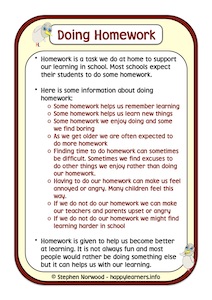
Back to list of Social Story Examples
login to Club
- cuento en Español
- Stories listing
- Newest stories
- my favorites
- magic and fantasy
- big concepts
- funny stories
- tender and sensitive
- Picture stories
- Classic Tales
- Download stories
- Our own tales -audio
- benefits of storytelling
- how to tell stories
- Teaching with stories
- how to create stories
- Imaginative Ideas for Stories
- Tales usage rules
- link to us!!
The Homework Party
Tap the calamus image below to get free access to our best collection of stories for children with related activities. Download it to enjoy our stories whenever you want
Advertisement
Main Lesson
Other langs..
Below you'll find the story text and a link to download it. Use it to improve the emotional and cognitive development of your children or your baby and enhance your parenting skills
Related values stories
- The Math Dunce
- A Colourful Head
- The Cloudsqueezer
"Charlieeeeeeee, do your homework now!" Wow, his mother was really bellowing at him . Charlie thought, "Well, she doesn't have to do it. It's so boring", and he spent hours with his books, hoping that time would pass and it would soon be time for supper . As usual, he was lying on his bed, busy staring at the ceiling, daydreaming. Suddenly some little elves, no more than a centimetre tall , appeared by the window.
"Good evening, young man, will you please give us your homework so we can play with it?", asked one of the elves, politely.
Charlie laughed.
"How are you lot going to play with homework? It's the most boring stuff there is! Ha, ha, ha... Go on, take it. You can play with it as long as you like" .
Charlie watched his guests, and was so surprised to see what they did. In less than a minute, they had formed teams and were busy playing with the pen, the eraser, the book, and the pad of paper. Very strange stuff they were getting up to . Like with the sums, instead of moving the pen across the paper, they would hold the pen still and move the paper instead. Or like how they had races to see who could do the sums fastest. And then they all dressed up as either Father Christmas , a Halloween pumpkin, or a bag of cheese. And whenever the clock was stopped, the elf who was in the lead got to draw himself in the notepad .
So the pad ended up full of Santas and pumpkins. They were also really funny while learning to read. They used well-known songs, and had to learn the words to them . When they had done that they put on a big concert to sing those songs. Charlie really enjoyed watching those little students, he even joined in with the singing. And time passed so quickly, that suddenly his mother was calling him for supper .
"Aww, what a pain! This is so much fun..." he groaned, as he got up to go to supper. "Of course it's fun! I already told you. Why don't you try it for a few days yourself? We'll all come back to see you again from time to time".
"Deal!" agreed Charlie.
So, every evening, Charlie started playing with his homework , inventing new and crazier ways to make it more fun. He would dress up, sing loads of songs, and do all manner of other things too. Now and again, his elf friends would turn up, although the truth was that he wasn't sure whether they really had come through the window or from out of his own imagination .
Neither Charlie's parents, nor his teachers, nor anyone in the whole school could understand the great change in him. From that day on, not only did he spend a lot more time doing homework , he did it perfectly, and accompanied with lots of drawings. He was very happy, and was always singing. His mother told him how proud she was at seeing him work so hard , especially at something she knew he found boring. But Charlie said to himself, "Well, she doesn't have to do it. It's fun!"
Did you like this story?
A colourful head , a story about avoid envy, topics in this story.
- stories of demotivated children
- stories of Study
- stories of Notebooks
- stories of Books
- stories of Pencils
Other even shorter stories

Popular topics
- stories of tidiness2
- stories of Responsibility
- stories of Enthusiasm
- stories of Friendship
- stories of Fear
Other versions and options for this story
- Add new comment
- Email this page
- PDF version
MORE PICTURE STORIES...
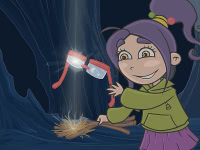
The Pleaseometer

The Full Warren
More animated stories....

The Monster in the Wardrobe
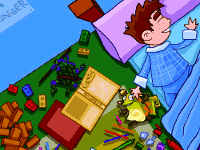
The Tidy Toys

Bula, the traveller

Boobuan monkeys

Edward and the Dragon

Waking Nightmare

( fortunately, sending them has no cost for us )
Would you rather look for stories, values and characters? You can do so using links below
search our tales collection

Browse this list with different children stories classifications available at our site
Stories classified by values, stories and tales classified by characters and elements.
Tap here to watch our new animated stories
stories classified by values
Bravery Caring nature Cleverness Comprehension Constancy Creativity Effort Forgiveness Friendship Generosity Goodness Humility Imagination Integration Joy Obedience OVERCOMING Patience Respect Self control Sharing Sincerity Teamwork tidiness Tolerance Trust more topics...

- Best rated stories
- Santa has stolen from me!
- The strange teacher who didn’t like his pupils
- An Adventure full of Paint
- A very healthy sneeze
- The Viking With a Hundred Horns
ECRP, Early Childhood Research & Practice is an excellent resource with articles for parents and teachers willing to investigate in the latest techniques and discoveries about early childhood education
Child & Family Web Guide is one of the best parenting resources directory

A short story about true love behind a beautiful face

A short story teaching children to do good

A short story about being sincere to reach the hearfelt desire
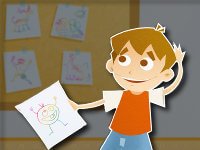
A children story about practicing with effor and joy

A story to teach the value of freedom

A funny short story to teach children to share their toys
A new world of stories to learn values within your family..
If you are not sure where to start, this is a cool sample of our best sections
- Short stories list
- Stories by category
- Latest published stories
Connect to the growing family of people using educational stories.
- Get in touch with a big community of readers. We are more than 170.000 people who like short stories on Facebook
- Start learning spanish with our great collection of short stories in spanish
- This is a site devoted to the whole family . Please share it with your own children and those of your friends.
Multiple resources to provide a creative education
- Using tales to teach
- Tips and tricks to educate
- Articles about education
- Workbook of Values
- Download audio stories
- Picture bedtime stories
And remember, all our stories are available as downloads in PDF format
- Terms of Use
- Privacy policy

The Homework Struggle – A short story
First, “Finish your reading worksheets Neel”, said mom.
Next, “No”, replied Neel curtly.
Further, she said, “It is just two worksheets. It will take hardly twenty minutes”, mom tried to reason out.
Then, “Nooooooooooo”, bellowed Neel.
Finally she said, “Finish your work, later you can have fun!”, asserted mom.
Then, Neel could not control his anger. Moreover, he threw his gadget on the floor.
But, Mom kept quiet. Then, she walked away.
Next, Neel continued to play with his gadgets.
Finally, after a while, mom got a chart. On the chart was a table. Neel was familiar with the Reward Chart Table. Furthermore, the table had tasks listed on it; the list of tasks he is supposed to do for the day. Therefore, if he completes the task, he earns his rewards.
Next, Mom put a red stripe on the column marked against a task “English worksheet”. Then, Neel understood. In other words, he gets three chances before he agrees to finish his work. If not, he misses his chance and loses his reward points.
Read a blog on Joining in – A social story
So, he is well aware of the system by now. Moreover, his teachers adopt the same approach at school. Also, Eliza follows the same chart at the therapy center. Also, at home, mom uses a similar chart to make sure his work is done on time.
Something inside him refuted the chart. “Why should someone else decide what I should do?”, he thinks.
Mom was quietly carrying on with her work. Neel knew that she was watching him through a corner of her eye. A part of him did not want to lose his chance to go to the park. The other part of him resisted control.
He decided to do things his way and continued to play with his gadget. He knew his mom was going to pop up the question again very soon.
Then, Mom wondered if there is any chance he would come back and finish his work himself. Because the assignment had to be submitted tomorrow. Nevertheless, she decided to broach the topic later. Moreover, things would get flared up if she approaches him now. In other words, meltdowns and tantrums are hard to manage.
“It is a tricky business”, she thought to herself, “getting the work done without an objection”.
But, she had tried different techniques before. Similarly, like every other mother, she too had got exasperated. Furthermore, she had tried being firm with him. Additionally, she had raised her voice to show who is the boss. But, that backfired really bad.
Neel would exhibit anger one moment, and the next second he would become a cry baby. So, he would meltdown and cry. She would then hug him and comfort him. It seemed too much of an ordeal to get a single task done.
She then asked Neel’s teachers and therapists for help. The therapists talked to him regarding his work. Neel would readily listen to his teachers and therapists. He would do the work assigned to him both in school and the therapy center, albeit at a much slower pace.
Further, out of 10 worksheets in a day, only two of them would get completed at school. Mom was really getting worried.
Neel would come home tired by evening. He only wanted to relax. Mom understood that. She gave him enough time to recuperate, cooked his favorite snack, let him play, and also watch his choice of TV Programs.
But when mom asked Neel to do any work, be it school work or some chores, the response was very strong. Moreover, all he wanted to do was to chill out. Home is a safe haven for him, where he is comfortable and is free to do things on his own accord.
When he was young, mom could lure him with some yummy snacks or his favorite toys. But as days passed by, he was getting smarter with his rebuttals.
Coming out of her reverie, mom looked at Neel again. Neel was busy playing with his iPad. Mom put the board before him, ready to mark the second stripe.
Neel was in no mood to give in. He continues to play with the gadget. When he saw mom coming up with the red marker, he walked away from his place.
He went to his room and shut the door.
Mom realized that it is futile to put the third stripe on the chart. She simply took away the reward points for the day. Neel was going to miss his swing time at the park.
An hour ticked by. Neel’s little sister came out running. It was time to go to the park. Their friends will be waiting to play.
Neel came out of the room and got ready to wear his shoes. His mom looked sternly at him. Neel looked at his mom briefly and then at the chart. He saw the three stripes glaring at him. He understood.
“No swing time”, he yells. He slammed the shoes on the floor and looked at his mom pleadingly.
Mom didn’t look into his eyes. She walked away into the kitchen. Neel followed his mom. “Mom, please”.
Mom didn’t answer. Neel sobbed uncontrollably. Her heart went out for her son.
“We could have avoided all this Neel. If only, you had listened to me”.
Neel didn’t understand. All he wanted now was his swing time. He cannot miss it. He kept pleading with mom repeatedly. At the end of the episode, both Neel and mom were exhausted.
Neel’s dad came back home tired after work. They all spent some time watching their favorite shows on television.
By night, the work is not yet complete. Mom got really worried about how to get the work done from Neel and asked dad for help.
Neel’s dad came up with an idea.
“Hey Neel, I have got some work to do. But I don’t want to do it alone. Can you give me company?”, he asked.
“Ok”, Neel said, “How about mom and Indu?”
“I will ask them also to come and give us company”, he said.
Mom came and sat at her workspace promptly but convincing Indu to work was an altogether different matter.
Neel’s dad asked Indu to do an activity of her choice, drawing. All four of them sat in the room to finish the work. Neel’s mom was relieved to see him at least start working on his worksheets.
“How long should I do these worksheets?”, Neel asked casually.
“Till You finish them”, mom answered.
“How long will it take for me to finish?”, Neel questioned back.
“It depends on how fast you work on it Neel”, mom responded.
After few minutes, Neel asked, “What are the plans for the weekend?”
Mom answered, “Let’s finish the work and we will talk about it”.
Neel threw the pencil on the floor.
Picture: The Homework Struggle – A short story
Dad said, “Let’s all stay quiet and get the work done”.
Dad then brought up the chart and listed all the four names on it.
“A red stripe for anyone who talks out of their turn and a green for those who complete their task”, he announced.
Mom agreed. Indu was engrossed in her artwork. Mom began typing very fast. Dad was finishing his office work. Neel looked around. He also started working on his sheets.
“I am done”, Indu said after a while.
Mom went and put a green stripe against her name on the chart.
Neel looked up, “What will she get as a reward?”, he questioned.
“You finish your work Neel”, Indu quipped.
Mom looked up. “I will let you know once he finished”. She ruffled his hair and went back to her work.
Neel finally finished his worksheets.
“Done”, he said.
Mom sighed a breath of relief.
She put a green stripe against his name and gave them both a warm hug and a much-deserved glass of hot chocolate.
“Let us do a family work time every day”, dad said.
“We will all work at the same time and complete our work”.
“Yay, yes. Let’s do it together”, Indu shouted in excitement.
“Let’s do it. What say Neel?”, Mom asked.
“Yes, It’s fun. Let’s do it together”, answered Neel.
The Homework Struggle – A short story. Leave us a comment if you found this story useful!
Read more: A short story 2
Book a session now
Recent Posts
- Joining in – A social story - June 23, 2021
- The Gadget Fit - May 31, 2021
- The Homework Struggle – A short story - May 15, 2021
Leave a Comment
(3 Comments)
Good story and the idea behind is very creative , useful for every mother who is after her kid for finishing assignments daily ! Keep up the work n keep coming more ! All the best
Good story and the idea behind it is quite original, valuable for any mother who is constantly on the lookout for her child’s homework completion! Keep up the good work and keep sending more! Best wishes
Glad you liked this! Thanks for your kind encouragement.
Cancel reply

Your email address will not be published. Required fields are marked *
Save my name, email, and website in this browser for the next time I comment.
- Mental Health
- Multilingual
- Occupational Therapy
- Speech Delay
- Speech Therapy
- Success Stories
- News of the month for March 2024 April 16, 2024
- News of the month for Jan 2024 January 29, 2024
- Shining a Light on the Unseen: The Importance of Syndrome Awareness January 23, 2024
- Celebrating Excellence: Pratiksha Gupta Wins SABLA NARI Award for Best Speech Language Therapist and Audiologist 2023 January 19, 2024
- Speech Beyond Lisps: Celebrating Diversity in Communication January 16, 2024
Don't miss our one of its kind SPEAK EASY PROGRAM for stuttering management. Chat with us to know more! Dismiss

In order to continue enjoying our site, we ask that you confirm your identity as a human. Thank you very much for your cooperation.

Homework Girl
Player rating 3.43/8.
Story Difficulty 4/8
Play Length 4/8
Maturity Level 5/8
Homework Girl is a normal, middle school girl. She loves hanging out with her friends, playing games, and eating pizza. But latley, she's been having some trouble adjusting to the seventh grade. Will she seek out the help and support of her friends, or will she seek to please her mom?
Player Comments
- Grimdark Fantasy
- Love & Dating
- Mystery / Thriller
- Family Friendly
- Puzzles / Games
- Edutainment
- Fan Fiction
- Newbie Central
- News & Updates
- The Parlor Room
- Creative Corner
- Writing Workshop
- Reading Corner
- Adv. Editor Forum
- Wishing Well
- Bugs and Problems
- Notifications
- Commendations
- View Profile
- CYOA History
- Privacy Policy
- Terms Of Service
How to create digital homework that students love
By Laura McClure on April 26, 2016 in TED-Ed Innovative Educators , TED-Ed Lessons
US History teacher Jennifer Hesseltine combined TED-Ed Lessons with an interactive blackboard to create a digital homework space that students love.
Let’s redesign homework. When’s the last time your students got excited to do homework? Or said things like, “Wow…just WOW. It is amazing how much is out there that we just don’t know about”? What if every homework assignment could expand a student’s worldview while engaging a kid’s natural curiosity? One middle school teacher took on this challenge — so you don’t have to.
For her TED-Ed Innovation Project , US History teacher Jennifer Hesseltine created a digital homework space that students love. Here are her step-by-step instructions on how you can do it too:
1. Go to TED-Ed and create a lesson . This will be your next homework assignment.
You can either create a lesson using any engaging video of your choice, or simply customize an existing TED-Ed Original or TED-Ed Select lesson. If you need help creating a lesson, read this . If you need help customizing a lesson, read this .
2. Create space for lessons in your current learning management system. This is your new digital homework space.
Give this homework space a fun title and a quick description. For inspiration, check out mine on Padlet. You don’t have to use Padlet — your school’s current interactive learning tools will probably work fine for this project. For more options, check out a few teacher-recommended apps or try the free tools for teachers from Google, Apple and Microsoft.
3. Add your TED-Ed lesson to your digital homework space using the customized lesson link.
If you need help sharing a customized lesson link, read this . Easy, right? You can complete Steps 1-3 of this project today.
“Wow…just WOW. It is amazing how much is out there that we just don’t know about.” — 8th grade student after watching the TED-Ed Lesson: “Exploring other dimensions ”
4. Add and remove lessons often from your digital homework space to keep the content fresh and exciting for students.
Students love TED-Ed lessons and the opportunity to learn. Here are a few quotes from my students on a midyear class survey:
- “TED-Ed videos are more fun than normal homework assignments.”
- “One pro about watching a TED-Ed homework video is that you get to answer the questions while you watch the video.”
- “One pro about watching a TED-Ed homework video is that I get to choose what videos to watch. I’m learning about things that interest me.”
5. Take the opportunity in class to highlight the latest lessons.
I always take 5-10 minutes to show students the new lessons I have added (and always make sure to tell them about my favorites).
6. Share the link to your digital homework space once with students at the beginning of the school year.
Your students will have access to any of your recommended TED-Ed Lessons for the remainder of the school year. I gave my students a list of due dates for the entire school year so that students can plan ahead to complete the assignments.
7. Be prepared for student engagement and student feedback.
Students will likely start going directly to the TED-Ed website and giving you ideas of which lessons they would like to see on the homework space, and/or they will want to create some lessons of their own! As a matter of fact…a few of my students have helped to create homework lessons.
An example of a lesson inspired by an 8th grade student (who approached me with the video and created the questions in the “Think” section) is “Francine’s Interview.” This student’s lesson, as one would imagine, is a favorite among her peers.
Send reminders to students about upcoming homework assignments since the assignment due dates are not on a regular schedule (i.e. — due every day, or every other day). Students forget about upcoming assignments since the assignments are all digital, and the due dates are spaced more than one week apart.
Prepare for students who either do not have internet access, or have a difficult time accessing a working computer/piece of technology outside of school. We need to work together to figure out times each week for them to access their homework. I have been very flexible with students in this regard, and will continue to work with these students to be sure that they have a fair opportunity to complete the homework assignments.
- If you have questions about how to replicate this project , please reach out to me on Twitter.
This article is part of the TED-Ed Innovation Project series, which highlights 25+ TED-Ed Innovation Projects designed by educators, for educators, with the support and guidance of the TED-Ed Innovative Educator program. You are welcome to share, duplicate and modify projects under this Creative Commons license to meet the needs of students and teachers. To get started, click here to take the first step.

Choose Your Test
Sat / act prep online guides and tips, how to do homework: 15 expert tips and tricks.
Coursework/GPA

Everyone struggles with homework sometimes, but if getting your homework done has become a chronic issue for you, then you may need a little extra help. That’s why we’ve written this article all about how to do homework. Once you’re finished reading it, you’ll know how to do homework (and have tons of new ways to motivate yourself to do homework)!
We’ve broken this article down into a few major sections. You’ll find:
- A diagnostic test to help you figure out why you’re struggling with homework
- A discussion of the four major homework problems students face, along with expert tips for addressing them
- A bonus section with tips for how to do homework fast
By the end of this article, you’ll be prepared to tackle whatever homework assignments your teachers throw at you .
So let’s get started!

How to Do Homework: Figure Out Your Struggles
Sometimes it feels like everything is standing between you and getting your homework done. But the truth is, most people only have one or two major roadblocks that are keeping them from getting their homework done well and on time.
The best way to figure out how to get motivated to do homework starts with pinpointing the issues that are affecting your ability to get your assignments done. That’s why we’ve developed a short quiz to help you identify the areas where you’re struggling.
Take the quiz below and record your answers on your phone or on a scrap piece of paper. Keep in mind there are no wrong answers!
1. You’ve just been assigned an essay in your English class that’s due at the end of the week. What’s the first thing you do?
A. Keep it in mind, even though you won’t start it until the day before it’s due B. Open up your planner. You’ve got to figure out when you’ll write your paper since you have band practice, a speech tournament, and your little sister’s dance recital this week, too. C. Groan out loud. Another essay? You could barely get yourself to write the last one! D. Start thinking about your essay topic, which makes you think about your art project that’s due the same day, which reminds you that your favorite artist might have just posted to Instagram...so you better check your feed right now.
2. Your mom asked you to pick up your room before she gets home from work. You’ve just gotten home from school. You decide you’ll tackle your chores:
A. Five minutes before your mom walks through the front door. As long as it gets done, who cares when you start? B. As soon as you get home from your shift at the local grocery store. C. After you give yourself a 15-minute pep talk about how you need to get to work. D. You won’t get it done. Between texts from your friends, trying to watch your favorite Netflix show, and playing with your dog, you just lost track of time!
3. You’ve signed up to wash dogs at the Humane Society to help earn money for your senior class trip. You:
A. Show up ten minutes late. You put off leaving your house until the last minute, then got stuck in unexpected traffic on the way to the shelter. B. Have to call and cancel at the last minute. You forgot you’d already agreed to babysit your cousin and bake cupcakes for tomorrow’s bake sale. C. Actually arrive fifteen minutes early with extra brushes and bandanas you picked up at the store. You’re passionate about animals, so you’re excited to help out! D. Show up on time, but only get three dogs washed. You couldn’t help it: you just kept getting distracted by how cute they were!
4. You have an hour of downtime, so you decide you’re going to watch an episode of The Great British Baking Show. You:
A. Scroll through your social media feeds for twenty minutes before hitting play, which means you’re not able to finish the whole episode. Ugh! You really wanted to see who was sent home! B. Watch fifteen minutes until you remember you’re supposed to pick up your sister from band practice before heading to your part-time job. No GBBO for you! C. You finish one episode, then decide to watch another even though you’ve got SAT studying to do. It’s just more fun to watch people make scones. D. Start the episode, but only catch bits and pieces of it because you’re reading Twitter, cleaning out your backpack, and eating a snack at the same time.
5. Your teacher asks you to stay after class because you’ve missed turning in two homework assignments in a row. When she asks you what’s wrong, you say:
A. You planned to do your assignments during lunch, but you ran out of time. You decided it would be better to turn in nothing at all than submit unfinished work. B. You really wanted to get the assignments done, but between your extracurriculars, family commitments, and your part-time job, your homework fell through the cracks. C. You have a hard time psyching yourself to tackle the assignments. You just can’t seem to find the motivation to work on them once you get home. D. You tried to do them, but you had a hard time focusing. By the time you realized you hadn’t gotten anything done, it was already time to turn them in.
Like we said earlier, there are no right or wrong answers to this quiz (though your results will be better if you answered as honestly as possible). Here’s how your answers break down:
- If your answers were mostly As, then your biggest struggle with doing homework is procrastination.
- If your answers were mostly Bs, then your biggest struggle with doing homework is time management.
- If your answers were mostly Cs, then your biggest struggle with doing homework is motivation.
- If your answers were mostly Ds, then your biggest struggle with doing homework is getting distracted.
Now that you’ve identified why you’re having a hard time getting your homework done, we can help you figure out how to fix it! Scroll down to find your core problem area to learn more about how you can start to address it.
And one more thing: you’re really struggling with homework, it’s a good idea to read through every section below. You may find some additional tips that will help make homework less intimidating.

How to Do Homework When You’re a Procrastinator
Merriam Webster defines “procrastinate” as “to put off intentionally and habitually.” In other words, procrastination is when you choose to do something at the last minute on a regular basis. If you’ve ever found yourself pulling an all-nighter, trying to finish an assignment between periods, or sprinting to turn in a paper minutes before a deadline, you’ve experienced the effects of procrastination.
If you’re a chronic procrastinator, you’re in good company. In fact, one study found that 70% to 95% of undergraduate students procrastinate when it comes to doing their homework. Unfortunately, procrastination can negatively impact your grades. Researchers have found that procrastination can lower your grade on an assignment by as much as five points ...which might not sound serious until you realize that can mean the difference between a B- and a C+.
Procrastination can also negatively affect your health by increasing your stress levels , which can lead to other health conditions like insomnia, a weakened immune system, and even heart conditions. Getting a handle on procrastination can not only improve your grades, it can make you feel better, too!
The big thing to understand about procrastination is that it’s not the result of laziness. Laziness is defined as being “disinclined to activity or exertion.” In other words, being lazy is all about doing nothing. But a s this Psychology Today article explains , procrastinators don’t put things off because they don’t want to work. Instead, procrastinators tend to postpone tasks they don’t want to do in favor of tasks that they perceive as either more important or more fun. Put another way, procrastinators want to do things...as long as it’s not their homework!
3 Tips f or Conquering Procrastination
Because putting off doing homework is a common problem, there are lots of good tactics for addressing procrastination. Keep reading for our three expert tips that will get your homework habits back on track in no time.
#1: Create a Reward System
Like we mentioned earlier, procrastination happens when you prioritize other activities over getting your homework done. Many times, this happens because homework...well, just isn’t enjoyable. But you can add some fun back into the process by rewarding yourself for getting your work done.
Here’s what we mean: let’s say you decide that every time you get your homework done before the day it’s due, you’ll give yourself a point. For every five points you earn, you’ll treat yourself to your favorite dessert: a chocolate cupcake! Now you have an extra (delicious!) incentive to motivate you to leave procrastination in the dust.
If you’re not into cupcakes, don’t worry. Your reward can be anything that motivates you . Maybe it’s hanging out with your best friend or an extra ten minutes of video game time. As long as you’re choosing something that makes homework worth doing, you’ll be successful.
#2: Have a Homework Accountability Partner
If you’re having trouble getting yourself to start your homework ahead of time, it may be a good idea to call in reinforcements . Find a friend or classmate you can trust and explain to them that you’re trying to change your homework habits. Ask them if they’d be willing to text you to make sure you’re doing your homework and check in with you once a week to see if you’re meeting your anti-procrastination goals.
Sharing your goals can make them feel more real, and an accountability partner can help hold you responsible for your decisions. For example, let’s say you’re tempted to put off your science lab write-up until the morning before it’s due. But you know that your accountability partner is going to text you about it tomorrow...and you don’t want to fess up that you haven’t started your assignment. A homework accountability partner can give you the extra support and incentive you need to keep your homework habits on track.
#3: Create Your Own Due Dates
If you’re a life-long procrastinator, you might find that changing the habit is harder than you expected. In that case, you might try using procrastination to your advantage! If you just can’t seem to stop doing your work at the last minute, try setting your own due dates for assignments that range from a day to a week before the assignment is actually due.
Here’s what we mean. Let’s say you have a math worksheet that’s been assigned on Tuesday and is due on Friday. In your planner, you can write down the due date as Thursday instead. You may still put off your homework assignment until the last minute...but in this case, the “last minute” is a day before the assignment’s real due date . This little hack can trick your procrastination-addicted brain into planning ahead!

If you feel like Kevin Hart in this meme, then our tips for doing homework when you're busy are for you.
How to Do Homework When You’re too Busy
If you’re aiming to go to a top-tier college , you’re going to have a full plate. Because college admissions is getting more competitive, it’s important that you’re maintaining your grades , studying hard for your standardized tests , and participating in extracurriculars so your application stands out. A packed schedule can get even more hectic once you add family obligations or a part-time job to the mix.
If you feel like you’re being pulled in a million directions at once, you’re not alone. Recent research has found that stress—and more severe stress-related conditions like anxiety and depression— are a major problem for high school students . In fact, one study from the American Psychological Association found that during the school year, students’ stress levels are higher than those of the adults around them.
For students, homework is a major contributor to their overall stress levels . Many high schoolers have multiple hours of homework every night , and figuring out how to fit it into an already-packed schedule can seem impossible.
3 Tips for Fitting Homework Into Your Busy Schedule
While it might feel like you have literally no time left in your schedule, there are still ways to make sure you’re able to get your homework done and meet your other commitments. Here are our expert homework tips for even the busiest of students.
#1: Make a Prioritized To-Do List
You probably already have a to-do list to keep yourself on track. The next step is to prioritize the items on your to-do list so you can see what items need your attention right away.
Here’s how it works: at the beginning of each day, sit down and make a list of all the items you need to get done before you go to bed. This includes your homework, but it should also take into account any practices, chores, events, or job shifts you may have. Once you get everything listed out, it’s time to prioritize them using the labels A, B, and C. Here’s what those labels mean:
- A Tasks : tasks that have to get done—like showing up at work or turning in an assignment—get an A.
- B Tasks : these are tasks that you would like to get done by the end of the day but aren’t as time sensitive. For example, studying for a test you have next week could be a B-level task. It’s still important, but it doesn’t have to be done right away.
- C Tasks: these are tasks that aren’t very important and/or have no real consequences if you don’t get them done immediately. For instance, if you’re hoping to clean out your closet but it’s not an assigned chore from your parents, you could label that to-do item with a C.
Prioritizing your to-do list helps you visualize which items need your immediate attention, and which items you can leave for later. A prioritized to-do list ensures that you’re spending your time efficiently and effectively, which helps you make room in your schedule for homework. So even though you might really want to start making decorations for Homecoming (a B task), you’ll know that finishing your reading log (an A task) is more important.
#2: Use a Planner With Time Labels
Your planner is probably packed with notes, events, and assignments already. (And if you’re not using a planner, it’s time to start!) But planners can do more for you than just remind you when an assignment is due. If you’re using a planner with time labels, it can help you visualize how you need to spend your day.
A planner with time labels breaks your day down into chunks, and you assign tasks to each chunk of time. For example, you can make a note of your class schedule with assignments, block out time to study, and make sure you know when you need to be at practice. Once you know which tasks take priority, you can add them to any empty spaces in your day.
Planning out how you spend your time not only helps you use it wisely, it can help you feel less overwhelmed, too . We’re big fans of planners that include a task list ( like this one ) or have room for notes ( like this one ).
#3: Set Reminders on Your Phone
If you need a little extra nudge to make sure you’re getting your homework done on time, it’s a good idea to set some reminders on your phone. You don’t need a fancy app, either. You can use your alarm app to have it go off at specific times throughout the day to remind you to do your homework. This works especially well if you have a set homework time scheduled. So if you’ve decided you’re doing homework at 6:00 pm, you can set an alarm to remind you to bust out your books and get to work.
If you use your phone as your planner, you may have the option to add alerts, emails, or notifications to scheduled events . Many calendar apps, including the one that comes with your phone, have built-in reminders that you can customize to meet your needs. So if you block off time to do your homework from 4:30 to 6:00 pm, you can set a reminder that will pop up on your phone when it’s time to get started.

This dog isn't judging your lack of motivation...but your teacher might. Keep reading for tips to help you motivate yourself to do your homework.
How to Do Homework When You’re Unmotivated
At first glance, it may seem like procrastination and being unmotivated are the same thing. After all, both of these issues usually result in you putting off your homework until the very last minute.
But there’s one key difference: many procrastinators are working, they’re just prioritizing work differently. They know they’re going to start their homework...they’re just going to do it later.
Conversely, people who are unmotivated to do homework just can’t find the willpower to tackle their assignments. Procrastinators know they’ll at least attempt the homework at the last minute, whereas people who are unmotivated struggle with convincing themselves to do it at a ll. For procrastinators, the stress comes from the inevitable time crunch. For unmotivated people, the stress comes from trying to convince themselves to do something they don’t want to do in the first place.
Here are some common reasons students are unmotivated in doing homework :
- Assignments are too easy, too hard, or seemingly pointless
- Students aren’t interested in (or passionate about) the subject matter
- Students are intimidated by the work and/or feels like they don’t understand the assignment
- Homework isn’t fun, and students would rather spend their time on things that they enjoy
To sum it up: people who lack motivation to do their homework are more likely to not do it at all, or to spend more time worrying about doing their homework than...well, actually doing it.
3 Tips for How to Get Motivated to Do Homework
The key to getting homework done when you’re unmotivated is to figure out what does motivate you, then apply those things to homework. It sounds tricky...but it’s pretty simple once you get the hang of it! Here are our three expert tips for motivating yourself to do your homework.
#1: Use Incremental Incentives
When you’re not motivated, it’s important to give yourself small rewards to stay focused on finishing the task at hand. The trick is to keep the incentives small and to reward yourself often. For example, maybe you’re reading a good book in your free time. For every ten minutes you spend on your homework, you get to read five pages of your book. Like we mentioned earlier, make sure you’re choosing a reward that works for you!
So why does this technique work? Using small rewards more often allows you to experience small wins for getting your work done. Every time you make it to one of your tiny reward points, you get to celebrate your success, which gives your brain a boost of dopamine . Dopamine helps you stay motivated and also creates a feeling of satisfaction when you complete your homework !
#2: Form a Homework Group
If you’re having trouble motivating yourself, it’s okay to turn to others for support. Creating a homework group can help with this. Bring together a group of your friends or classmates, and pick one time a week where you meet and work on homework together. You don’t have to be in the same class, or even taking the same subjects— the goal is to encourage one another to start (and finish!) your assignments.
Another added benefit of a homework group is that you can help one another if you’re struggling to understand the material covered in your classes. This is especially helpful if your lack of motivation comes from being intimidated by your assignments. Asking your friends for help may feel less scary than talking to your teacher...and once you get a handle on the material, your homework may become less frightening, too.
#3: Change Up Your Environment
If you find that you’re totally unmotivated, it may help if you find a new place to do your homework. For example, if you’ve been struggling to get your homework done at home, try spending an extra hour in the library after school instead. The change of scenery can limit your distractions and give you the energy you need to get your work done.
If you’re stuck doing homework at home, you can still use this tip. For instance, maybe you’ve always done your homework sitting on your bed. Try relocating somewhere else, like your kitchen table, for a few weeks. You may find that setting up a new “homework spot” in your house gives you a motivational lift and helps you get your work done.

Social media can be a huge problem when it comes to doing homework. We have advice for helping you unplug and regain focus.
How to Do Homework When You’re Easily Distracted
We live in an always-on world, and there are tons of things clamoring for our attention. From friends and family to pop culture and social media, it seems like there’s always something (or someone!) distracting us from the things we need to do.
The 24/7 world we live in has affected our ability to focus on tasks for prolonged periods of time. Research has shown that over the past decade, an average person’s attention span has gone from 12 seconds to eight seconds . And when we do lose focus, i t takes people a long time to get back on task . One study found that it can take as long as 23 minutes to get back to work once we’ve been distracte d. No wonder it can take hours to get your homework done!
3 Tips to Improve Your Focus
If you have a hard time focusing when you’re doing your homework, it’s a good idea to try and eliminate as many distractions as possible. Here are three expert tips for blocking out the noise so you can focus on getting your homework done.
#1: Create a Distraction-Free Environment
Pick a place where you’ll do your homework every day, and make it as distraction-free as possible. Try to find a location where there won’t be tons of noise, and limit your access to screens while you’re doing your homework. Put together a focus-oriented playlist (or choose one on your favorite streaming service), and put your headphones on while you work.
You may find that other people, like your friends and family, are your biggest distraction. If that’s the case, try setting up some homework boundaries. Let them know when you’ll be working on homework every day, and ask them if they’ll help you keep a quiet environment. They’ll be happy to lend a hand!
#2: Limit Your Access to Technology
We know, we know...this tip isn’t fun, but it does work. For homework that doesn’t require a computer, like handouts or worksheets, it’s best to put all your technology away . Turn off your television, put your phone and laptop in your backpack, and silence notifications on any wearable tech you may be sporting. If you listen to music while you work, that’s fine...but make sure you have a playlist set up so you’re not shuffling through songs once you get started on your homework.
If your homework requires your laptop or tablet, it can be harder to limit your access to distractions. But it’s not impossible! T here are apps you can download that will block certain websites while you’re working so that you’re not tempted to scroll through Twitter or check your Facebook feed. Silence notifications and text messages on your computer, and don’t open your email account unless you absolutely have to. And if you don’t need access to the internet to complete your assignments, turn off your WiFi. Cutting out the online chatter is a great way to make sure you’re getting your homework done.
#3: Set a Timer (the Pomodoro Technique)
Have you ever heard of the Pomodoro technique ? It’s a productivity hack that uses a timer to help you focus!
Here’s how it works: first, set a timer for 25 minutes. This is going to be your work time. During this 25 minutes, all you can do is work on whatever homework assignment you have in front of you. No email, no text messaging, no phone calls—just homework. When that timer goes off, you get to take a 5 minute break. Every time you go through one of these cycles, it’s called a “pomodoro.” For every four pomodoros you complete, you can take a longer break of 15 to 30 minutes.
The pomodoro technique works through a combination of boundary setting and rewards. First, it gives you a finite amount of time to focus, so you know that you only have to work really hard for 25 minutes. Once you’ve done that, you’re rewarded with a short break where you can do whatever you want. Additionally, tracking how many pomodoros you complete can help you see how long you’re really working on your homework. (Once you start using our focus tips, you may find it doesn’t take as long as you thought!)

Two Bonus Tips for How to Do Homework Fast
Even if you’re doing everything right, there will be times when you just need to get your homework done as fast as possible. (Why do teachers always have projects due in the same week? The world may never know.)
The problem with speeding through homework is that it’s easy to make mistakes. While turning in an assignment is always better than not submitting anything at all, you want to make sure that you’re not compromising quality for speed. Simply put, the goal is to get your homework done quickly and still make a good grade on the assignment!
Here are our two bonus tips for getting a decent grade on your homework assignments , even when you’re in a time crunch.

#1: Do the Easy Parts First
This is especially true if you’re working on a handout with multiple questions. Before you start working on the assignment, read through all the questions and problems. As you do, make a mark beside the questions you think are “easy” to answer .
Once you’ve finished going through the whole assignment, you can answer these questions first. Getting the easy questions out of the way as quickly as possible lets you spend more time on the trickier portions of your homework, which will maximize your assignment grade.
(Quick note: this is also a good strategy to use on timed assignments and tests, like the SAT and the ACT !)
#2: Pay Attention in Class
Homework gets a lot easier when you’re actively learning the material. Teachers aren’t giving you homework because they’re mean or trying to ruin your weekend... it’s because they want you to really understand the course material. Homework is designed to reinforce what you’re already learning in class so you’ll be ready to tackle harder concepts later.
When you pay attention in class, ask questions, and take good notes, you’re absorbing the information you’ll need to succeed on your homework assignments. (You’re stuck in class anyway, so you might as well make the most of it!) Not only will paying attention in class make your homework less confusing, it will also help it go much faster, too.

What’s Next?
If you’re looking to improve your productivity beyond homework, a good place to begin is with time management. After all, we only have so much time in a day...so it’s important to get the most out of it! To get you started, check out this list of the 12 best time management techniques that you can start using today.
You may have read this article because homework struggles have been affecting your GPA. Now that you’re on the path to homework success, it’s time to start being proactive about raising your grades. This article teaches you everything you need to know about raising your GPA so you can
Now you know how to get motivated to do homework...but what about your study habits? Studying is just as critical to getting good grades, and ultimately getting into a good college . We can teach you how to study bette r in high school. (We’ve also got tons of resources to help you study for your ACT and SAT exams , too!)
These recommendations are based solely on our knowledge and experience. If you purchase an item through one of our links, PrepScholar may receive a commission.

Ashley Sufflé Robinson has a Ph.D. in 19th Century English Literature. As a content writer for PrepScholar, Ashley is passionate about giving college-bound students the in-depth information they need to get into the school of their dreams.
Ask a Question Below
Have any questions about this article or other topics? Ask below and we'll reply!
Improve With Our Famous Guides
- For All Students
The 5 Strategies You Must Be Using to Improve 160+ SAT Points
How to Get a Perfect 1600, by a Perfect Scorer
Series: How to Get 800 on Each SAT Section:
Score 800 on SAT Math
Score 800 on SAT Reading
Score 800 on SAT Writing
Series: How to Get to 600 on Each SAT Section:
Score 600 on SAT Math
Score 600 on SAT Reading
Score 600 on SAT Writing
Free Complete Official SAT Practice Tests
What SAT Target Score Should You Be Aiming For?
15 Strategies to Improve Your SAT Essay
The 5 Strategies You Must Be Using to Improve 4+ ACT Points
How to Get a Perfect 36 ACT, by a Perfect Scorer
Series: How to Get 36 on Each ACT Section:
36 on ACT English
36 on ACT Math
36 on ACT Reading
36 on ACT Science
Series: How to Get to 24 on Each ACT Section:
24 on ACT English
24 on ACT Math
24 on ACT Reading
24 on ACT Science
What ACT target score should you be aiming for?
ACT Vocabulary You Must Know
ACT Writing: 15 Tips to Raise Your Essay Score
How to Get Into Harvard and the Ivy League
How to Get a Perfect 4.0 GPA
How to Write an Amazing College Essay
What Exactly Are Colleges Looking For?
Is the ACT easier than the SAT? A Comprehensive Guide
Should you retake your SAT or ACT?
When should you take the SAT or ACT?
Stay Informed
Get the latest articles and test prep tips!
Looking for Graduate School Test Prep?
Check out our top-rated graduate blogs here:
GRE Online Prep Blog
GMAT Online Prep Blog
TOEFL Online Prep Blog
Holly R. "I am absolutely overjoyed and cannot thank you enough for helping me!”

Improving life at home and work
Is Homework Good for Kids? Here’s What the Research Says
A s kids return to school, debate is heating up once again over how they should spend their time after they leave the classroom for the day.
The no-homework policy of a second-grade teacher in Texas went viral last week , earning praise from parents across the country who lament the heavy workload often assigned to young students. Brandy Young told parents she would not formally assign any homework this year, asking students instead to eat dinner with their families, play outside and go to bed early.
But the question of how much work children should be doing outside of school remains controversial, and plenty of parents take issue with no-homework policies, worried their kids are losing a potential academic advantage. Here’s what you need to know:
For decades, the homework standard has been a “10-minute rule,” which recommends a daily maximum of 10 minutes of homework per grade level. Second graders, for example, should do about 20 minutes of homework each night. High school seniors should complete about two hours of homework each night. The National PTA and the National Education Association both support that guideline.
But some schools have begun to give their youngest students a break. A Massachusetts elementary school has announced a no-homework pilot program for the coming school year, lengthening the school day by two hours to provide more in-class instruction. “We really want kids to go home at 4 o’clock, tired. We want their brain to be tired,” Kelly Elementary School Principal Jackie Glasheen said in an interview with a local TV station . “We want them to enjoy their families. We want them to go to soccer practice or football practice, and we want them to go to bed. And that’s it.”
A New York City public elementary school implemented a similar policy last year, eliminating traditional homework assignments in favor of family time. The change was quickly met with outrage from some parents, though it earned support from other education leaders.
New solutions and approaches to homework differ by community, and these local debates are complicated by the fact that even education experts disagree about what’s best for kids.
The research
The most comprehensive research on homework to date comes from a 2006 meta-analysis by Duke University psychology professor Harris Cooper, who found evidence of a positive correlation between homework and student achievement, meaning students who did homework performed better in school. The correlation was stronger for older students—in seventh through 12th grade—than for those in younger grades, for whom there was a weak relationship between homework and performance.
Cooper’s analysis focused on how homework impacts academic achievement—test scores, for example. His report noted that homework is also thought to improve study habits, attitudes toward school, self-discipline, inquisitiveness and independent problem solving skills. On the other hand, some studies he examined showed that homework can cause physical and emotional fatigue, fuel negative attitudes about learning and limit leisure time for children. At the end of his analysis, Cooper recommended further study of such potential effects of homework.
Despite the weak correlation between homework and performance for young children, Cooper argues that a small amount of homework is useful for all students. Second-graders should not be doing two hours of homework each night, he said, but they also shouldn’t be doing no homework.
Not all education experts agree entirely with Cooper’s assessment.
Cathy Vatterott, an education professor at the University of Missouri-St. Louis, supports the “10-minute rule” as a maximum, but she thinks there is not sufficient proof that homework is helpful for students in elementary school.
“Correlation is not causation,” she said. “Does homework cause achievement, or do high achievers do more homework?”
Vatterott, the author of Rethinking Homework: Best Practices That Support Diverse Needs , thinks there should be more emphasis on improving the quality of homework tasks, and she supports efforts to eliminate homework for younger kids.
“I have no concerns about students not starting homework until fourth grade or fifth grade,” she said, noting that while the debate over homework will undoubtedly continue, she has noticed a trend toward limiting, if not eliminating, homework in elementary school.
The issue has been debated for decades. A TIME cover in 1999 read: “Too much homework! How it’s hurting our kids, and what parents should do about it.” The accompanying story noted that the launch of Sputnik in 1957 led to a push for better math and science education in the U.S. The ensuing pressure to be competitive on a global scale, plus the increasingly demanding college admissions process, fueled the practice of assigning homework.
“The complaints are cyclical, and we’re in the part of the cycle now where the concern is for too much,” Cooper said. “You can go back to the 1970s, when you’ll find there were concerns that there was too little, when we were concerned about our global competitiveness.”
Cooper acknowledged that some students really are bringing home too much homework, and their parents are right to be concerned.
“A good way to think about homework is the way you think about medications or dietary supplements,” he said. “If you take too little, they’ll have no effect. If you take too much, they can kill you. If you take the right amount, you’ll get better.”
More Must-Reads from TIME
- Melinda French Gates Is Going It Alone
- Lai Ching-te Is Standing His Ground
- Do Less. It’s Good for You
- There's Something Different About Will Smith
- What Animal Studies Are Revealing About Their Minds—and Ours
- What a Hospice Nurse Wants You to Know About Death
- 15 LGBTQ+ Books to Read for Pride
- Want Weekly Recs on What to Watch, Read, and More? Sign Up for Worth Your Time
Write to Katie Reilly at [email protected]
- PRO Courses Guides New Tech Help Pro Expert Videos About wikiHow Pro Upgrade Sign In
- EDIT Edit this Article
- EXPLORE Tech Help Pro About Us Random Article Quizzes Request a New Article Community Dashboard This Or That Game Popular Categories Arts and Entertainment Artwork Books Movies Computers and Electronics Computers Phone Skills Technology Hacks Health Men's Health Mental Health Women's Health Relationships Dating Love Relationship Issues Hobbies and Crafts Crafts Drawing Games Education & Communication Communication Skills Personal Development Studying Personal Care and Style Fashion Hair Care Personal Hygiene Youth Personal Care School Stuff Dating All Categories Arts and Entertainment Finance and Business Home and Garden Relationship Quizzes Cars & Other Vehicles Food and Entertaining Personal Care and Style Sports and Fitness Computers and Electronics Health Pets and Animals Travel Education & Communication Hobbies and Crafts Philosophy and Religion Work World Family Life Holidays and Traditions Relationships Youth
- Browse Articles
- Learn Something New
- Quizzes Hot
- This Or That Game
- Train Your Brain
- Explore More
- Support wikiHow
- About wikiHow
- Log in / Sign up
- Education and Communications
- Study Skills
- Homework Skills
How to Finish Your Homework
Last Updated: May 6, 2024 Fact Checked
This article was co-authored by Emily Listmann, MA . Emily Listmann is a Private Tutor and Life Coach in Santa Cruz, California. In 2018, she founded Mindful & Well, a natural healing and wellness coaching service. She has worked as a Social Studies Teacher, Curriculum Coordinator, and an SAT Prep Teacher. She received her MA in Education from the Stanford Graduate School of Education in 2014. Emily also received her Wellness Coach Certificate from Cornell University and completed the Mindfulness Training by Mindful Schools. There are 17 references cited in this article, which can be found at the bottom of the page. This article has been fact-checked, ensuring the accuracy of any cited facts and confirming the authority of its sources. This article has been viewed 281,201 times.
While studying can differ for different age groups, many of the things that get in the way are the same. Whether it's your environment or time management skills, it easy for things to discourage you from finishing your homework. With a little organization and help, your homework can become approachable.
Managing Your Time

- For instance, try setting aside a time you know you can work well such as an hour or 2 before dinner, or if you're a night owl, after dinner.

- Work in hour blocks, with 50 minutes spent studying and 10 minutes spent taking a break.
- It can also be helpful to move around when you are taking your break, especially if you are working at a screen. Go for a walk outside to get your blood circulating and enjoy some fresh air.
- You might also want to eat a healthy snack on your break to improve your focus. Avoid junk food and choose something like a handful of nuts, a piece of fruit, veggies, or a small portion of cottage cheese.

- Identify which assignments are worth the most points for each class. Most likely these will take the longest to complete. [5] X Research source
- Consider how long you have to do each project, and if possible, see when the assignment is introduced. Oftentimes, primary and secondary school classes do not have syllabi, so it might be harder to plan out an entire term, but if you are in college, you will most likely have a syllabus with at least a partial course schedule. Knowing how long you have to complete an assignment will help you prioritize which assignments to do first. You can also ask the teacher how long you have to complete an assignment. [6] X Research source

- Use highlighters or stickers to mark which assignments are most important.
- If you're using an online or mobile schedule, create alerts or notifications for the projects and any time-sensitive steps for those projects.

- Don't let a big project overshadow the smaller assignments you need to complete!

- Assignment outlines can help you visualize the necessary tasks to get the assignment done.

Creating a Productive Work Environment

- A desk or table would be a better location than a couch or a bed.

- Turn your phone off or on silent (not vibrate). It might be best to put the phone out of sight, or in another room while you work, as the temptation to text or get on social media can be as much of a distraction as actually using social media.
- Use an app that blocks social media. There are plenty of applications out there that can help block social media and other distracting sites (such as shopping or gaming sites). [10] X Trustworthy Source Pew Research Center Nonpartisan thinktank conducting research and providing information on public opinion, demographic trends, and social trends Go to source

- Use a white noise app to block out noise.
- Use earplugs or noise-blocking earmuffs. [12] X Research source
- Work in a quiet place, such as a library or a home office, if you have one.
- Avoid listening to music while studying. Studies have shown that although listening to music while studying lowers overall performance, this does not affect everyone equally. [13] X Research source However listening to music before studying has been shown to improve performance on cognitive tasks. [14] X Research source

Using Your Resources

- If you're too afraid to ask a teacher during class, see if you can stay behind to ask your questions.

- First, contact your school to see if there are any after-school tutoring programs. While not all primary and secondary schools offer tutoring, a vast majority of universities do. If your school does not offer tutoring, they may know of other resources for you to contact.
- Then, contact your library to see if they offer any tutoring. [18] X Research source
- In some areas, there may also be free community tutoring programs. Contact your local community center for more information.
- There are plenty of private tutors out there as well, but they can be costly (ranging from $20 to $100 an hour). [19] X Research source You can find tutors online through a number of websites, such as Craigslist or Angie's list.

- If you need to work at a library after school, ask your parents or search the web to find your local library.
Supercharge Your Studying with this Expert Series

Community Q&A
Reader Videos
- Don't feel too stressed or you'll be doing less work than you actually can. Thanks Helpful 7 Not Helpful 3
- Make sure you’re getting enough sleep. Thanks Helpful 5 Not Helpful 3
- Maintain a healthy diet. Thanks Helpful 5 Not Helpful 3

- Recommended time doing homework varies by age. The National PTA recommends about 10 minutes per grade level per night (30 minutes a night for the third grade). Thanks Helpful 9 Not Helpful 0
- Some people may need additional help in order to focus on their homework and finish it. If you are struggling in school, ask your parents or teachers about what resources may be available, and seek out professional help or ask your parents to do so, if necessary. Thanks Helpful 29 Not Helpful 9
- If you are under the age of thirteen, you may need to obtain your parents’ permission before downloading any computer applications. Thanks Helpful 30 Not Helpful 13
You Might Also Like

- ↑ https://kidshealth.org/en/teens/homework.html
- ↑ https://www.takingcharge.csh.umn.edu/power-habit-charles-duhigg
- ↑ https://www.edutopia.org/article/research-tested-benefits-breaks/
- ↑ https://www.wma.us/about/titan-blog/post/~board/titan-blog/post/how-to-prioritize-school-assignments-and-homework
- ↑ https://jhsap.org/self_help_resources/school-life_balance//
- ↑ https://lsc.cornell.edu/how-to-study/studying-for-and-taking-exams/guidelines-for-creating-a-study-schedule/
- ↑ https://success.oregonstate.edu/learning/concentration
- ↑ https://www.pewresearch.org/internet/2020/07/28/parenting-children-in-the-age-of-screens/
- ↑ https://kidshealth.org/en/teens/homework.html/
- ↑ https://absn.northeastern.edu/blog/8-things-to-keep-in-your-at-home-study-space/
- ↑ https://scholar.utc.edu/theses/171/
- ↑ https://onlinelibrary.wiley.com/doi/abs/10.1002/acp.1731
- ↑ https://kidshealth.org/en/teens/talk-to-parents.html
- ↑ https://rdw.rowan.edu/cgi/viewcontent.cgi?article=2412&context=etd
- ↑ https://blogs.chapman.edu/scst/2016/02/09/what-tutoring-is-and-what-tutoring-is-not/
- ↑ https://undergrad.stanford.edu/tutoring-support
- ↑ https://www.ideaedu.org/idea-notes-on-instruction/encouraged-students-to-use-multiple-resources-e-g-internet-library-holdings-outside-experts-to-improve-understanding/
About This Article

- Send fan mail to authors
Reader Success Stories
Darrell Rivers
Oct 16, 2021
Did this article help you?
Sep 13, 2021
Rowan Kennedy
Sep 9, 2016
Oct 19, 2021
Oct 9, 2021

Featured Articles

Trending Articles

Watch Articles

- Terms of Use
- Privacy Policy
- Do Not Sell or Share My Info
- Not Selling Info
Get all the best how-tos!
Sign up for wikiHow's weekly email newsletter
- Skip to main content
- Keyboard shortcuts for audio player
From Our Listeners
Sometimes the dog really does eat your homework.
Last week, we brought you the story of how the phrase "The Dog Ate My Homework" came to be and how it morphed into a palpably ridiculous excuse. Turns out, sometimes its not an excuse at all. Weekend Edition host Scott Simon has a few stories from our listeners that swear, honest, the dog did eat their homework.
Copyright © 2012 NPR. All rights reserved. Visit our website terms of use and permissions pages at www.npr.org for further information.
NPR transcripts are created on a rush deadline by an NPR contractor. This text may not be in its final form and may be updated or revised in the future. Accuracy and availability may vary. The authoritative record of NPR’s programming is the audio record.
Because differences are our greatest strength
ADHD in teens, from friendships to forgetting homework (Miya’s story)

Listen & Subscribe
- Apple Podcasts opens in a new tab
- Spotify opens in a new tab
- YouTube opens in a new tab
Stay in the know
All our latest podcasts delivered right to your inbox.
Miya Kofo is a 16-year-old high school student with ADHD — and the star of Understood’s “Be the Reason” campaign to fight stigma around learning and thinking differences. Miya was diagnosed in middle school. Her dad, who also has ADHD, helped her see it was nothing to be ashamed of and that she could accomplish anything.
Host Laura Key and Miya talk about how ADHD is still often ignored in girls, and how the pressure to be perfect can make symptoms even worse. Miya also shares her thoughts about TikTok — the positives (getting the word about ADHD out there) and the negatives (“doom scrolling”) for people with ADHD.
Related resources
See Miya in our " Be the reason" campaign video
ADHD in high school: 4 signs you might see
ADHD in girls vs. ADHD in boys
What is a 504 plan?
Episode transcript
Miya: When my dad started relating things to me and showing me that there wasn't anything wrong with me — that I was actually really similar to him when he was a kid — it really made me realize there's not anything wrong with me. Like I'm not less than like the other girls at school, like, I'm not stupid. It's just these symptoms of ADHD. And I think having someone there that was that close to me to tell me that there's not anything wrong with me really helps my self-esteem.
Laura: From the Understood Podcast Network. This is "ADHD Aha!," a podcast where people share the moment when it finally clicked that they or someone they know has ADHD. My name is Laura Key. I'm the editorial director here at Understood, and as someone who's had my own ADHD "aha" moment, I'll be your host. I'm here today with Miya Kofo. Miya is a high school student who lives in Rutherford, New Jersey. She was also the star of Understood's "Be the Reason" campaign, to fight stigma around learning and thinking differences. Welcome, Miya.
Miya: Thank you for having me.
Laura: When did you get diagnosed with ADHD, Miya?
Miya: I would say about sixth grade when my parents kind of started to relate my symptoms to my dad's symptoms when he was younger. And that diagnosis really helped me because from that point on, I got like 504 plans and a lot of extra help in school to just help me do better in my work.
Laura: That's great. And how old are you now?
Miya: I'm 16.
Laura: So, you said that your dad has ADHD, is that right?
Miya: Yeah, he does. And growing up, he didn't really have any of those resources and he actually got diagnosed as an adult. So, he really wanted to make sure that his kids really, like, had their resources available to them early on.
Laura: Oh, that's wonderful. Good for him. What kind of signs was he noticing in you?
Miya: Just stuff like I wouldn't do my work on time — but not like kid things were, like, they just don't want to do their work — like stuff where I actually couldn't do the work. Like, I just couldn't bring myself to put a pen to paper and just get the work done. And that lack of motivation really let him know.
Laura: Did you notice too that you were struggling with these things that your dad was noticing, or did he really point them out to you for the first time?
Miya: Well, I just thought that they were normal. I kind of knew that my friends didn't struggle with that, but I thought, like, I don't know, maybe I'm like stupid or something, which now I know was like a common misconception that a lot of kids struggling with that pre diagnosis have. But now I know like it really wasn't like stupid or less than or anything, it was just like ADHD and struggling with those symptoms.
Laura: Anything in particular that your dad said to you that really made you feel more comfortable with yourself and your diagnosis?
Miya: Yeah, so I would say, like once I started having those symptoms of ADHD, he kind of shared his stories with me of when he was little to make me feel like there wasn't anything wrong with me, that I needed to get these resources and help in the future so I can do better, and like that is a possibility. Because like when I was little, I was like, "Oh my God, I'm not going to go to college. I'm not going to ever be able to do my work, like, I'm going to be a failure and like a wreck."
But when my dad told me his stories and told me like "I did struggle with these things. But like I did go to college, I did like I have a family and all these things." I was like, "OK, so it's not that bad. Things can get better." And I think like relating to a person that I am close to really made me feel like there was hope for the future.
Laura: That sounds like an "aha" moment in and of itself. Walk me through an example of when you wanted to do something, you knew you needed to do something, but you just couldn't bring yourself to do it.
Miya: Well, it was always things like every summer my mom would give me like a little workbook to do and she would be like, "I'll give you like 50 bucks if you do this whole workbook." And a lot of kids would be like, "Wow, that's a lot of money and I'll do it. I'll get it done." But for me, even though I wanted that money, and I wanted that reward, I just couldn't bring myself to do it.
Laura: What kinds of things would you do instead?
Miya: I would just like go on my tablet, like play with my friends, like go outside, and she'd be like, "You can use this time to get money and buy stuff and have fun." And I was like, "No, I'm OK." But now, like after my diagnosis, I find that I know my things that I do, and I know how I can avoid a task. So, when I see myself doing that, I'm like, "OK, Miya, we need to get the work done so we can enjoy the reward of it later."
Laura: I think you also mentioned that you didn't listen. What was that about?
Miya: Yeah, like if my parents or teachers would tell me to do things, I'd just like, wouldn't. I had bad grades when I was little because I really just, like, didn't do my work. And they would tell me, like, "Do your work so you can get good grades. You can like get into better classes and just do better overall." And I just wouldn't make that connection. I would just think of really what I wanted to do in the moment and not really what I need to work towards.
Laura: Would you ever do your homework and then forget to turn it in?
Miya: Oh, my gosh. All the time. And it makes, like, you sound like you're lying to the teacher because you're like, I totally forgot this essay at home, and they're like "You just didn't do it." And I'm like, "No, I swear." So, now I've come up with a couple of skills to, like, really keep my work together and keep it organized.
Laura: That's something that we talk about at Understood.org in our parenting resources is like sometimes a surprise sign of ADHD is, you know, they'll do the homework, but then it just doesn't make it to the teacher, to the class.
Miya: Yeah, definitely. Yeah.
Laura: Were there other kids in your class that that was happening for or were you alone in this?
Miya: Oh, for sure. And I feel like a lot of times with girls who have ADHD, it sometimes is seen less than boys. So, like if a boy has ADHD, they're like, "Oh, OK, he's a boy, like, we can help him." But I feel like girls aren't really given the room to make those mistakes in school and they're seeing like, "Oh, she's a girl. Like, she should just be able to get her work done." I feel like that kind of also made me feel less than in school because looking at my girl peers and my friends, I would be like, "Why am I doing like these boy things, like forgetting my homework and mouthing off and stuff?" You know?
Laura: It's interesting that that's still happening today. I was going to ask you about that because as a girl who, a woman now, who grew up with ADHD, we talk a lot about what it was like and how girls would fly under the radar. It sounds like that still happens.
Miya: Yeah, definitely. I would say so. And I still see it like in school and stuff and I'm like, I don't know why this isn't fixed yet, but I'm glad I got diagnosed, so I know it's not something wrong with me.
Laura: Yes. You're a success story in this realm for sure.
Miya: What have been some of your struggles personally being a girl with ADHD?
Laura: Thanks for that question. I would, I think I always blamed myself.
Miya: Yeah.
Laura: That's not necessarily gender specific, but you alluded to the pressure that girls and women put on themselves to be perfect. That was definitely something that I faced. I just figured if I just tried harder than I could make it all go away. And I really burnt myself out. And also, just brushing off things that I think society tells us are just like it's a girl thing, like, oh, you're too emotional or you're too sensitive or you're too... you're annoying, because you're talking so much or whatever. And just internalizing that as a flaw as opposed to acknowledging it as a symptom of something else.
Miya: Yeah, that last part really resonates because even like specifically the talking symptom, for girls, girls have this thing where like they mask their symptoms of ADHD a lot of times. And I think that a lot of times like growing up, girls feel like they kind of always have to be the one to, like, apologize. So, I think a lot of girls like growing up with those symptoms of ADHD probably really do feel like there's something wrong with them. But I don't know. I hope that a lot of people, like in the future generations make changes and just like to help those young girls growing up.
Laura: Yeah. I couldn't agree more.
Laura: I think socially it can be tricky as well. And again, I'm making kind of some massive generalizations here, but I think that girls have a lot of pressure to keep their friendships perfect as well.
Miya: Definitely. Yeah, yeah, for sure.
Laura: I just have this image in my mind, as flawed as it is, of a boy being like, "OK, I'm out here, bye!" and a girl being like, "If I leave too quickly, are they going to think that I don't like them?" Or if I say the wrong thing like and I have to preserve my friendships and I think that girls put a lot of pressure on themselves when it comes to friendship, and they don't get a lot of grace for the things that often are ADHD difficulties.
Miya: And I feel like sometimes that overthinking cycle of like the symptoms can sometimes make them worse and then not knowing that these symptoms are because of something can make them worse and also make your self-esteem so much worse.
Laura: How is ADHD — I'm going to totally date myself here, I'm going to sound so old, Miya. I'm sorry — how is ADHD perceived in your age group these days? I know you're only one person. You can't speak for a whole generation. But in your class even, how is ADHD perceived among teenagers?
Miya: Just talking to my dad, he said that when he was younger, like even boys, they didn't even know what ADHD was. His parents didn't. Like, nobody really was able to make those connections. But now I think that a lot of people do know what ADHD is, but I feel like sometimes even when I tell my friends and stuff that I have ADHD, people are like shocked because when they think of things like ADHD and learning differences, they think of the most extreme. Like someone just like sits at home all day, doesn't do their work, doesn't shower, like stuff like that. And it's like, no, like it's a spectrum. Like, it's so much more common than people think.
And I really think if people learn that and that becomes like so much more normalized in society, then I feel like it'll help a lot of kids younger than me, like growing up to not feel like they're less than and something's wrong with them.
Laura: Do you share that sentiment openly with your friends? Do you talk with them like that?
Miya: Yeah. I mean, like, my friends know I have ADHD and like they know the campaign and like, I'm not really afraid. Like, I don't hide the fact that I have ADHD or learning differences.
Laura: Good for you. That's really impressive. Truly. Have you ever experienced or noticed kids with ADHD getting made fun of or the word ADHD being the butt of a joke, even if it wasn't directed at someone?
Miya: Yeah, I would say definitely. Growing up if you had ADHD, again, like I said, people just think of the most extreme and sometimes people do represent that extreme in school and I think they would definitely get made fun of. And even sometimes people forget to do things or stop and they just use ADHD as like a bad thing where they're like, "Oh my God, I'm so ADHD," like things like that. And I think that does perpetuate the stereotype and the negative stigmas that come along with it.
Laura: I totally agree with you. I was going to bring up that example. "I'm so ADHD," that's just a thing that's said. What other kinds of expressions or things do people say that you wish that they would stop saying?
Miya: Just making yourself seem like you have these learning differences or like you can relate to those people as like a joke just because you forgot to do your homework or something. Or like making it seem like worse than it actually is just because you want to be like, funny because it does hurt those people that do struggle with it on a bigger scale.
Laura: Yeah, I can see that because when you have ADHD, things are really heightened. And to your point, it's a spectrum, but still, it's like, it's consistent and it can diminish the reality of what it's like to have ADHD. When people say, "Oh yeah, I have it too," or whatever. What about it on TikTok? You got to talk to me about TikTok, Miya. There's a lot of ADHD self-diagnosis and ADHD stuff happening on TikTok. How do you feel about that?
Miya: Well, I don't know. I think that in recent years a lot of like self-diagnosis has gone on, especially with my generation. There's a lot of TikTok-ers now who spread ADHD awareness and talk about the symptoms, and I think that it is way more common than people think. So, they could have ADHD. But also, I think that when people self-diagnose, it hurts the cause in a way, because you're just like spreading things and like spreading your symptoms that people with ADHD actually like really struggle with it don't relate to. And they could be like, "Why am I like worse than this person?" but it's because like they don't actually have ADHD, you know?
Laura: Yeah, that makes a lot of sense.
Miya: I personally don't use TikTok that much because of this thing I recently learned about called doom scrolling, that like really affects people with ADHD because they get hyper fixed on things. So, I'll just be like scrolling and scrolling and then I look up and it's been like 2 hours. So, I found that personally TikTok isn't really a good app for me, and it can get me stuck in those cycles where I don't end up doing work or anything like that in a day.
But I have found that when I do go on the app, there are so many resources for people with ADHD and it's really crazy because I really didn't see anything like that when I was younger on apps like Musically, which I had when I was little. And I think that it's so good. I'm really happy that it's being like really widespread because let's say like a little kid has been like struggling with these symptoms and they think there's something wrong with them. And then they come across a video spreading awareness. I think it can help so many young kids.
Laura: Where do you think you would be with your grades if you hadn't gotten diagnosed with ADHD?
Miya: I don't think I would be doing good in school. Like, I would probably be failing because, you know, like the 504 plan that helps me so much and I get extra help in tests and stuff and I really think, I don't know, I might even gotten pulled back if I didn't get that diagnosis because that extra time and that help from teachers and learning how to help myself and those resources to really like do good in school and just live as a like normal person really helped me. And I don't think I'd be doing like as good as I am now if I didn't get diagnosed.
So, I'm really glad that, at least from my standpoint in the education world, like for teachers and educators and administrators, they've really come to understand it and wanted to like help those people they teach.
Laura: That is so good to hear. You know, I've heard horror stories about kids who get accommodations getting made fun of and saying like, "Oh, you're cheating" or something like that, which we know that's not the case. Right? We're leveling the playing field.
Laura: What other kinds of symptoms did you struggle with? We've talked about forgetfulness. We've talked about lack of motivation. What about hyperactivity? Any restlessness, fidgetiness, anything like that?
Miya: Oh, definitely. Like when I was younger and just talking in class, like talking to anyone, not being able to sit still during parent-teacher conferences. The one like constant thing throughout all my grades was like, she talks too much, she talks to everybody, and when like we're in a test, she won't stop talking. And I think that's definitely a symptom of ADHD. And now I understand that, and like I said, like I have a balance in school. But yeah, that was always something that came up.
Laura: Yeah, definitely an ADHD symptom. How did ADHD or how has ADHD affected your social life?
Miya: A lot of times for me personally with ADHD, it kind of makes me think, not think less of others, but kind of just think more of myself and not really try to totally understand where other people are coming from. So, like with my friends, we got into so many fights, so it would be like maybe I said something that hurts my friend and I'm like, either I totally don't remember saying it because I was just like saying things and not thinking, or I just, like, really didn't try to think of how it affected them because I was just so in my own world.
Laura: Last time we talked, I think you said that people perceived you as selfish.
Miya: Yeah, I would say so. I mean, I think, like growing up after my diagnosis, I noticed a lot of things about myself, and I would say that it's not totally selfish when people with ADHD do that, that's not their intent, but it can often come off like that.
Laura: And what are your friendships like now? Do you still feel like you're perceived as selfish, or are there any hiccups in your social life right now, or has that shifted as well?
Miya: Yeah, well, like no friendship is like perfect, but now I have a lot of friends that I love them for and like me and my best friend personally, I feel like me with my ADHD and just like being forgetful and kind of in my own world, we got into so many fights when I was little, like always bickering and stuff, but now we're like so close and it's really good because I found that, like, I just need to learn to listen to people more and really put myself in their shoes. And I think that all my friendships thus thrived as a result.
Laura: How do you do that? I mean, do you have any pointers for me? Honestly, because the ADHD brain makes it so hard to pump the brakes and stop yourself from interrupting people and to take a breath, you know? Would you teach me, Miya? Please.
Miya: Well, yeah, I've had to really, really learn to think before I speak, because honestly, I think that was a big problem in my relationships when I was younger, that I would just not think before I would speak and I would just blurt everything out. So, now like at least I try. I take like care in what I say to people and like I really think before I say something like how they could interpret that or like how that could possibly hurt someone. And I think that my friendships have lasted longer as a result.
Laura: So, when we were chatting, you mentioned something about noticing, "toxic cycles" and how that was related to becoming more self-aware. Can you talk a little bit about that?
Miya: Yeah. So, I think that with my social life, but even with school, I've really had to notice those cycles that I do like. Let's say it's for school, like getting an assignment, not doing it, getting that bad grade and then feeling bad about myself, and then it starts all over again. So even though it took me a while to notice those things, I think it really did help me in all the different aspects of my life. And I personally think that quarantine really helped me with that because school kind of slowed down. So, I was able to like really grasp like what I needed to do to do better in school and even my social life.
And probably because I was so young, like sixth grade when I got the diagnosis, I really couldn't fully understand what ADHD meant and what the symptoms were and how I needed to help myself rather than like those accommodations and my parents helping me because I think it's like a two-part thing, like your parents need to help you, you need those outside things, like other resources, but you really also need to notice those cycles in yourself and really need to, like, help yourself also.
Laura: Oh, that's beautiful. What advice do you have to other kids like you who have ADHD?
Miya: I would say there's not anything wrong with you. Like you're not less than if you have ADHD and you have these differences, and you can harness your ADHD to do great things. Because I find that people with ADHD usually are really creative. So, you can put like your hands into an art form or something or something where you really just got to like dive into it and really focus all your energy in it. But alongside that, you do need to find ways and resources to do your work and get those things done.
Laura: Absolutely. Miya, it has been so wonderful to talk with you. It's so refreshing to talk with such a bright, amazing teenager and to learn from you. And I'm really grateful for your time.
Miya: Yeah. Thank you so much. Thank you for having me here. It's been so nice to have this conversation.
Laura: You've been listening to "ADHD Aha!" from the Understood Podcast Network. If you want to share your own "aha" moment, email us at [email protected]. I'd love to hear from you.
If you want to learn more about the topics we covered today, check out the show notes for this episode. We include more resources as well as links to anything we mentioned in the episode.
Understood is a nonprofit organization dedicated to helping people who learn and think differently, discover their potential and thrive. We have no affiliation with pharmaceutical companies. Learn more at Understood.org/mission. "ADHD Aha!" is produced by Jessamine Molli. Say hi, Jessamine!
Jessamine: Hi everyone.
Laura: Briana Berry is our production director. Our theme music was written by Justin D. Wright, who also mixes the show. For the Understood Podcast Network, Scott Cocchiere is our creative director, Seth Melnick is our executive producer, and I'm your host, Laura Key. Thanks so much for listening.

is executive director of editorial at Understood and host of the “ADHD Aha!” podcast.
Latest episodes

June 11, 2024
Toxic productivity, remembering to remember, and rejection sensitivity (Jesse Anderson’s story)
After diagnosis, Jesse Anderson went from thinking he couldn’t have ADHD, to advocating and writing an everyday guide on it.

June 4, 2024
ADHD hacks with William Curb
William Curb, host of the Hacking Your ADHD podcast, shares his story and some strategies.

May 28, 2024
An ADHD coach on being a defiant teen, ADHD overwhelm, and self-care (Caren Magill’s story)
ADHD coach and podcast host Caren Magill gets real about her experience as a teen girl with undiagnosed ADHD.

May 14, 2024
Pushing boundaries, breaking norms, and the ADHD brain (Casey McQuiston’s story)
Casey McQuiston, best-selling author of Red, White and Royal Blue , shares their ADHD story.

May 7, 2024
A personal conversation about being a mom (and woman) with ADHD
Being a mom with ADHD is hard. Host Laura Key chats with her friend and colleague Rae Jacobson, also a mom with ADHD.

April 30, 2024
The pain of struggling with basic tasks: ADHD in the pandemic (Ellyce Fulmore’s story)
Author Ellyce Fulmore struggled with impulsive spending and doing “ basic ” daily tasks during the pandemic. The pain of coping with that led to her ADHD diagnosis.

April 16, 2024
An ADHD coach on burnout (Jaye Lin’s story)
ADHD coach Jaye Lin was a gifted kid with undiagnosed ADHD. Now, she’s building communities and helping others cope with ADHD burnout.

April 2, 2024
Impulse buying, negative bank balances, and the ADHD tax (Paulette Perhach’s story)
Writer Paulette Perhach had money coming in but struggled to keep it in her bank account. An ADHD diagnosis brought her struggles into perspective.

March 19, 2024
Why “just try harder” is a myth (David Flink’s story)
Eye to Eye founder David Flink is fighting the “just try harder” myth surrounding ADHD, dyslexia, and other learning and thinking differences.

March 5, 2024
“Why don’t you listen?” Paying attention vs. hearing (Peter’s story)
Peter Jones used to feel better saying he had a hearing problem rather than considering ADHD. Now, he knows he has ADHD and isn't afraid to say it.
Tell us what interests you
- International edition
- Australia edition
- Europe edition

How to teach … story writing
Some of the most popular summer homework projects involve story writing. The Guardian Teacher Network has resources to help students of all ages to write stories at home over the summer or next term.
The first step is great storytelling, especially before children's writing skills have caught up with their speaking and listening. Sso thanks to primary school teacher Des Hegarty for sharing with us some simple story maps for retelling the classic tales of The Three Little Pigs and Little Red Riding Hood . Also find story openings , an oral activity to help pupils explore different ways to open re-tellings of familiar stories.
Children's author and illustrator Alexis Deacon , creator of primary school classics Beegu and Slow Loris, has shared a really interesting lesson plan aimed at key stage 2 teachers. Ingredients of a story has been based on workshops Alexis does in schools to help children think about what makes a story, the rules and vocabulary of some of the stories they know – and to explore the instinctive way human beings tend to make characters and stories from the world around them.
The Phoenix weekly comic book team has created some really lovely resources that will particularly help reluctant writers get in the swing of story writing. The Thought bubble challenge will help to develop text and dialogue in stories and what makes a good character encourages children to explore their visual literacy and really think about the characters in their stories.
For secondary school-aged story writers, here is some inspiration on the importance of developing great characters: Faulkes on Fiction: a story of the novel in 28 characters is a book by Sebastian Faulks, shared here in PDF form, which examines the most famous and dazzling fictional characters and their impact on British culture, from Sherlock Holmes to Mr Darcy to Emma Woodhouse and James Bond. Can your students create a unique character over the holidays or next term? There's more motivation for older writers from secondary English teacher Alex Frost who has written this poem on story genres .
Inexperienced or less confident writers may need help with structure to stop the curse of the rambling story. A good beginning and good ending are vital ingredients – which is why Primary Leap has created its writing a story series. The Magical Boots , The Lost Island and Super Hero will help students learn how to tie up loose ends and make their stories interesting and engaging.
The craft of writing is further explored in King Onomatopoeia and other stories .
You don't want your students writing stories to a formula, but these handy checklists from Twinkl will help younger writers keep their stories on track. Here's a checklist on writing a great story opening and one on creating tension in stories . Download and print out checklists on story resolution , story problems and on creating the perfect setting for a story . Children can add their own points to the lists. This writing frame on analysing structure problems will also help children to explore possible solutions to their story problems.
Sometimes a picture prompt is all that's needed to spark the imagination – find these creative writing worksheets on a football match , camping holiday and magic potion . Students look at the picture and think of an interesting story to go with it.
These Pie Corbett -inspired story recount frames The Papaya that Spoke and Monkey See, Monkey Do have been designed to improve children's fluency in retelling this story, both in the spoken and written word.
It's amazing what a lovely border in which to write a story can do to get the creative juices flowing. Twinkl has created a whole load for every mood and topic including night time , star and moon , monsters , fruit and veg , Africa , fairies and transport .
Of course readers make writers, so set your students and/or children the summer reading challenge over the holidays. You can find out more from the Reading Agency . This year's theme is Creepy House .
And finally, some great tips for young writers from master storyteller Michael Morpurgo, including the importance of reading stories aloud. These have been put together as part of the Wicked Young Writers Award , which is open from 2 September. Find this guide to the competition – a chance to share those fabulous stories students have written over the summer perhaps?
Join the Guardian Teacher Network for free access to teaching resources and an opportunity to share your own as well as read and comment on blogs. There are also thousands of teaching, leadership and support jobs on the site. Visit http://jobs.theguardian.com/schools .
- Teacher Network
- How to teach ...
- English and creative writing
- Primary school teaching resources
Comments (…)
Most viewed.
The Surprising History of Homework Reform
Really, kids, there was a time when lots of grownups thought homework was bad for you.

Homework causes a lot of fights. Between parents and kids, sure. But also, as education scholar Brian Gill and historian Steven Schlossman write, among U.S. educators. For more than a century, they’ve been debating how, and whether, kids should do schoolwork at home .

At the dawn of the twentieth century, homework meant memorizing lists of facts which could then be recited to the teacher the next day. The rising progressive education movement despised that approach. These educators advocated classrooms free from recitation. Instead, they wanted students to learn by doing. To most, homework had no place in this sort of system.
Through the middle of the century, Gill and Schlossman write, this seemed like common sense to most progressives. And they got their way in many schools—at least at the elementary level. Many districts abolished homework for K–6 classes, and almost all of them eliminated it for students below fourth grade.
By the 1950s, many educators roundly condemned drills, like practicing spelling words and arithmetic problems. In 1963, Helen Heffernan, chief of California’s Bureau of Elementary Education, definitively stated that “No teacher aware of recent theories could advocate such meaningless homework assignments as pages of repetitive computation in arithmetic. Such an assignment not only kills time but kills the child’s creative urge to intellectual activity.”
But, the authors note, not all reformers wanted to eliminate homework entirely. Some educators reconfigured the concept, suggesting supplemental reading or having students do projects based in their own interests. One teacher proposed “homework” consisting of after-school “field trips to the woods, factories, museums, libraries, art galleries.” In 1937, Carleton Washburne, an influential educator who was the superintendent of the Winnetka, Illinois, schools, proposed a homework regimen of “cooking and sewing…meal planning…budgeting, home repairs, interior decorating, and family relationships.”
Another reformer explained that “at first homework had as its purpose one thing—to prepare the next day’s lessons. Its purpose now is to prepare the children for fuller living through a new type of creative and recreational homework.”
That idea didn’t necessarily appeal to all educators. But moderation in the use of traditional homework became the norm.
Weekly Newsletter
Get your fix of JSTOR Daily’s best stories in your inbox each Thursday.
Privacy Policy Contact Us You may unsubscribe at any time by clicking on the provided link on any marketing message.
“Virtually all commentators on homework in the postwar years would have agreed with the sentiment expressed in the NEA Journal in 1952 that ‘it would be absurd to demand homework in the first grade or to denounce it as useless in the eighth grade and in high school,’” Gill and Schlossman write.
That remained more or less true until 1983, when publication of the landmark government report A Nation at Risk helped jump-start a conservative “back to basics” agenda, including an emphasis on drill-style homework. In the decades since, continuing “reforms” like high-stakes testing, the No Child Left Behind Act, and the Common Core standards have kept pressure on schools. Which is why twenty-first-century first graders get spelling words and pages of arithmetic.
Support JSTOR Daily! Join our new membership program on Patreon today.

JSTOR is a digital library for scholars, researchers, and students. JSTOR Daily readers can access the original research behind our articles for free on JSTOR.
Get Our Newsletter
More stories.

The Impact JSTOR in Prison Has Made on Me

Sex (No!), Drugs (No!), and Rock and Roll (Yes!)

Wild Saints and Holy Fools

Building Classroom Discussions around JSTOR Daily Syllabi
Recent posts.
- The Psychological Problems of Modern Warfare
- Reading for Juneteenth
- Elephants, Decadence, and LGBTQ Records
- The Huts of the Appalachian Trail
- On the Anniversary of Iceland’s Independence
Support JSTOR Daily
Sign up for our weekly newsletter.
- Grades 6-12
- School Leaders
100 Last-Day-of-School Activities Your Students Will Love!
120 Short Story Ideas and Prompts To Get Creativity Flowing
Suddenly they won’t stop writing!
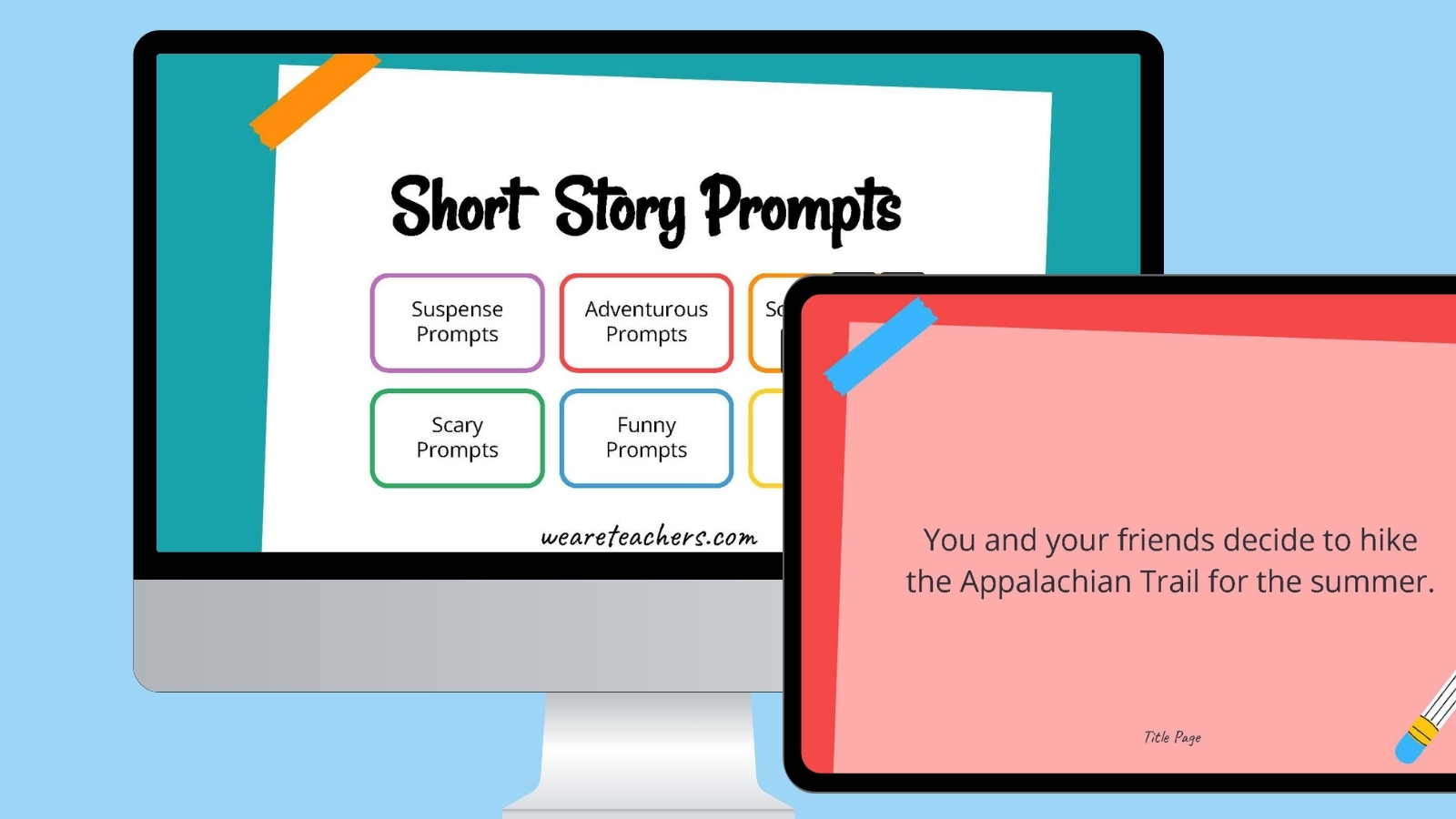
Some of my favorite teaching moments came from a unit that culminated with my students writing an original short story. When given the freedom to write fiction, so many of my students came alive. They wanted to write suspense, mystery, horror, or romance. They wanted their characters to feel like real people. Suddenly, after weeks of ignoring my helpfully provided feedback, they were crowding my desk to ask me to read their work. It was glorious. Narrative writing is a wonderful way to allow every student to use the skills they’ve practiced in class to create something new. Getting started, however, can often be tricky. This is where I’ve found short story prompts to be so helpful. Give your students the following list of intriguing short story prompts and ideas and watch what they create.
Want this entire set of short story ideas and prompts in one easy document? Get your free PowerPoint or Google Slides bundle by submitting your email here .
Suspenseful Short Story Ideas
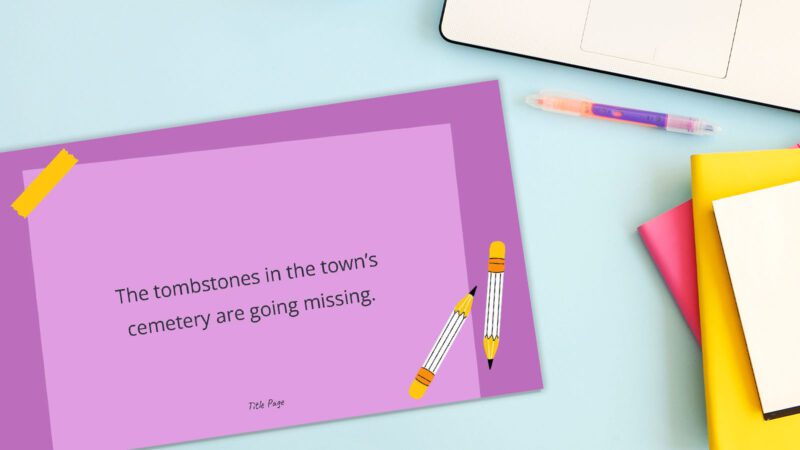
- The tombstones in the town’s cemetery are going missing.
- You discover the new student at school looks exactly like you.
- There are muddy footprints leading up to the front door of the house … but it hasn’t rained for days.
- An obscure relative passes away and leaves you $500,000 in their will under the condition that you move into their 100-year-old house immediately … alone.
- A new app promises to help you get your life together, and it works! If you follow everything it tells you to do, you have an awesome day. If you don’t follow it exactly …
- A teen discovers their house is being haunted by a student who went missing from their school decades earlier. The only thing the ghost wants is to bring their murderer to justice.
- A student starts experiencing strange blackouts and wakes up in unfamiliar places with no memory of how they got there.
- Your friend starts receiving anonymous threatening messages, and you must help unravel the mystery of who is behind them before it’s too late.
- During a camping trip, a group of friends hears strange noises in the woods and discovers they’re not alone.
- A girl begins experiencing déjà vu, realizing that the events she’s experiencing have already happened before.
- After the recent solar eclipse, things just feel different. You try talking about it with your friends, but no one seems to believe you.
- A teen starts seeing shadowy figures following other students around just before something bad happens to them.
- A school field trip goes wrong when the group of students gets stranded in a museum during a blizzard. As the power goes out and it keeps getting colder, they’ll have to work together if they want to survive.
- During first period, you receive an anonymous text that something terrible is going to happen at the end of the school day. The text tells you that you have until the end of the day to stop it from happening.
- You’re not proud of it, but you and your friends used to pick on a kid at recess when you were in elementary school. He moved away before middle school, but now he’s back, and it seems like he wants revenge.
- A teen has to clear their name when their teacher wrongly accuses them of cheating on the midterm exam.
- When a teen discovers information that seems to prove he and his best friend were switched at birth, he starts to wonder if that’s why he’s always felt more comfortable hanging out at his friend’s house instead of his own.
- You and your friends are loving the new “Truth or Dare” cell phone game, until the truths get a bit too personal and the dares a bit too dangerous. But when you try to stop, you discover the app isn’t as harmless as it first appeared.
- A teen and their best friend decide to throw caution to the wind and pick up a hitchhiker for the first time ever. But things quickly go awry.
- A girl starts receiving mysterious packages in the mail containing items that seem to be connected to her past.
Adventurous Short Story Ideas
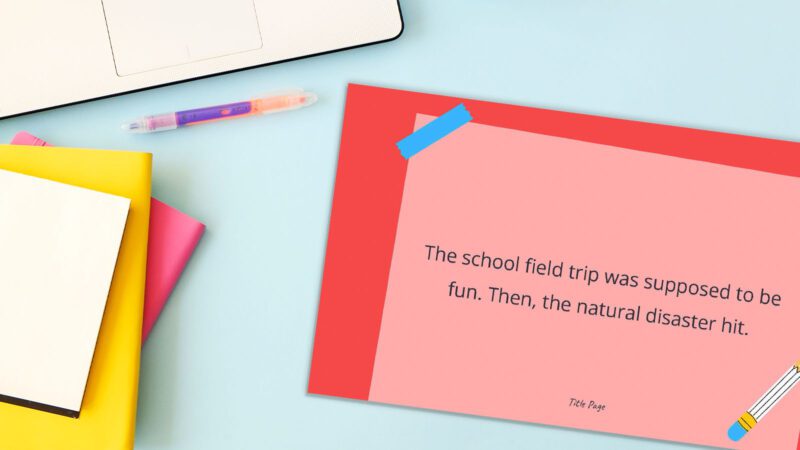
- The school field trip was supposed to be fun. Then, the natural disaster hit.
- You are obsessed with the ancient Aztecs. When a mysterious corporation that claims to have mastered time travel recruits you to travel back to the 15th century to learn more about what life was like for Aztec children, you agree almost immediately. Will you regret your decision?
- You and your friends decide to hike the Appalachian Trail for the summer.
- A group of friends embarks on a camping trip in the wilderness, only to stumble upon a hidden cave filled with treasure and traps.
- You just found out that your mother/father is a spy for the CIA. In addition to that crazy realization, they tell you they need your help for one very important mission.
- A teenager finds a mysterious message in a bottle washed up on the beach, sparking a thrilling adventure to uncover its sender.
- You lose a bet with your most adventurous friend, and for one day you have to say yes to whatever crazy activities they choose.
- Two rival teams compete in a scavenger hunt across the city, racing against time and each other to find hidden clues and treasures.
- A group of teens joins a sailing expedition to explore uncharted islands, but they soon encounter dangerous storms and ancient curses.
- You receive a mysterious package containing a key to a forgotten family estate, where you uncover a legacy of adventure and intrigue.
- A group of friends forms a detective agency to solve mysteries in their neighborhood, uncovering hidden secrets and foiling villains.
- A young explorer decides to climb the tallest mountain in the world, facing treacherous terrain and extreme weather conditions.
- A teenager discovers a hidden treasure map in an old book, leading them on a quest to find a legendary pirate’s treasure.
- A group of friends embarks on a cross-country road trip, encountering unexpected obstacles and forging lifelong memories along the way.
- You and your friends set out on a kayaking expedition down a remote river but soon encounter dangerous rapids and wild animals.
- A young explorer sets out to traverse a vast desert, facing sandstorms and mirages as they search for a lost oasis.
- A group of teens forms a treasure-hunting club, exploring abandoned mines and forgotten ruins in search of hidden riches.
- Two siblings discover a secret society of adventurers hidden beneath their town, where they must prove themselves worthy to join their ranks.
- A teenager discovers a hidden cave on a remote island, where they find ancient artifacts and clues to a lost civilization.
- You and your friends decide to explore an abandoned mine, where you uncover hidden tunnels and encounter supernatural phenomena.
Science Fiction Short Story Ideas
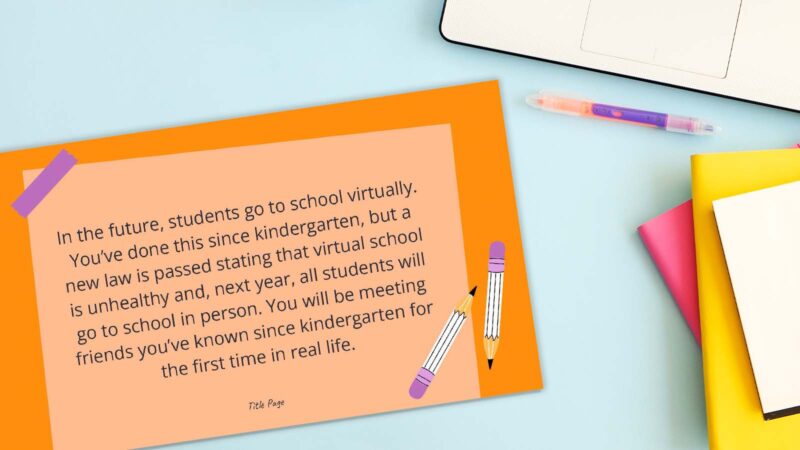
- In the future, students go to school virtually. You’ve done this since kindergarten, but a new law is passed stating that virtual school is unhealthy and, next year, all students will go to school in person. You will be meeting friends you’ve known since kindergarten for the first time in real life.
- After several disastrous presidential elections, the country votes to choose the next president randomly from among every citizen in the country. You think it’s a sort of stupid idea … until your name is selected.
- A girl discovers a portal to a parallel universe in her backyard shed, where she meets alternate versions of herself and must work together to solve a mystery.
- Scientists have solved all the world’s problems, and we now live in a utopia … or do we?
- Your family has been selected to join 24 other families colonizing Mars. At the first meeting, you realize that the kid who has bullied you since elementary school is also on the mission.
- A young girl wakes up one day to find that she has developed telekinetic powers, and she must learn to control them while navigating the challenges of middle school.
- Due to a computer virus, all social media disappears overnight. It might not ever come back. How does that change things?
- Like every other kid in the year 2122, you were given your very own robot best friend when you were little, and it’s grown up with you. One day, your robot friend tells you that the robots are planning on taking over the world and imprisoning the humans.
- A boy discovers a crashed spaceship in the forest behind his house and must protect the alien pilot from government agents while helping it repair its ship.
- A group of kids stumbles upon a hidden laboratory in the mountains, where they uncover a plot to control the weather and must race against time to stop it.
- A group of students discovers a time machine hidden in the school basement, leading to thrilling adventures throughout history.
- During a class field trip to a space station, students accidentally get launched into orbit and must find a way to return to Earth.
- You and your friends find a hidden alien spaceship buried beneath your backyard and discover you can fly it.
- A student wakes up one morning and discovers they’re reliving the same day over and over again.
- You receive a mysterious message from your future self, warning of a catastrophic event that must be prevented.
- During a class project on robotics, you and your lab partner accidentally create an artificial intelligence that becomes self-aware.
- Your best friend discovers they can teleport, leading to thrilling adventures as they explore the world and beyond.
- A group of friends uncovers a hidden laboratory beneath the school, filled with advanced technology and secret experiments.
- You and your friends find a mysterious ancient artifact hidden in the school library, unlocking its secrets, and triggering a global blackout.
- On his 16th birthday, a teen learns that he and his family are actually aliens. His parents are alien scientists living on Earth to study humans and what it’s like to raise their child as a human.
Scary Short Story Ideas
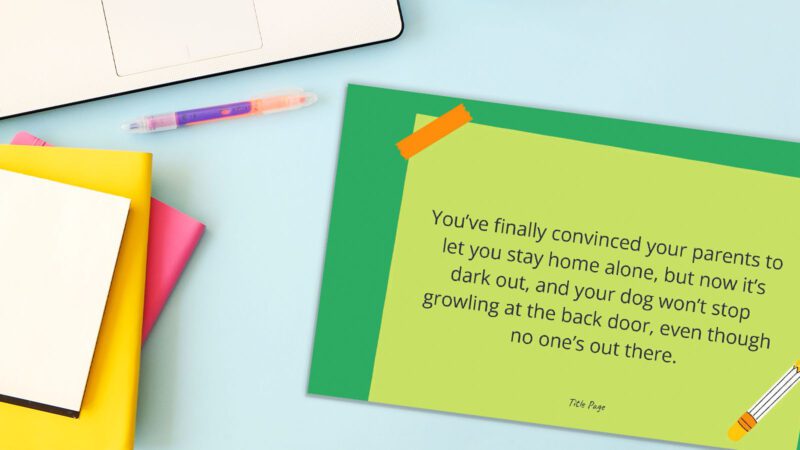
- You’ve finally convinced your parents to let you stay home alone, but now it’s dark out, and your dog won’t stop growling at the back door, even though no one’s out there.
- While camping on a school field trip, the chaperones all get sick/injured. You and your best friend are the two students chosen to hike back in the dark for help.
- A sinister figure is spotted watching from the shadows of the school grounds.
- As the power went out during a storm, strange whispers began echoing through the house.
- You and your friends explore an abandoned amusement park, only to discover it’s not as deserted as it seems.
- After receiving a new phone as a present, you start receiving mysterious text messages from an unknown number, foretelling ominous events.
- You were born and raised in a house that’s over 100 years old and never found it a bit spooky. But when you return home after suffering a concussion during a soccer game, you start to notice shadows that seem to move on their own and the sounds of people walking in empty rooms.
- A strange illness spreads among students, causing them to behave strangely and forget chunks of time.
- A seemingly innocent game of hide-and-seek takes a dark turn when someone goes missing.
- While on vacation, you bought an antique locket from a weird little store you found while sightseeing. Whenever you put it on, it makes you feel more confident and powerful … and angry.
- The teens didn’t believe in Ouija boards until the things their Ouija board told them started coming true.
- A new student joins the class, but there’s something unsettling about their appearance and behavior.
- During a camping trip, someone discovers strange symbols carved into the trees, leading to a terrifying discovery.
- After bringing a cursed object to school for show-and-tell, a series of bizarre occurrences unfolds.
- Your best friend discovers a hidden room in the school basement, revealing a dark history that should have stayed buried.
- The school yearbook contains a cursed photograph that causes those who look at it to experience horrifying visions.
- You begin receiving threatening letters from an anonymous sender, which escalates into a terrifying game of cat and mouse.
- You and your friends see a strange figure wandering the school at night, leaving behind cryptic messages written on the walls. But when you tell the principal, she assumes you’re pulling a prank.
- A series of disturbing paintings appear overnight in the art classroom, each one depicting a horrifying scene.
- You receive a cursed doll as a gift, unleashing a terrifying chain of events.
Funny Short Story Ideas
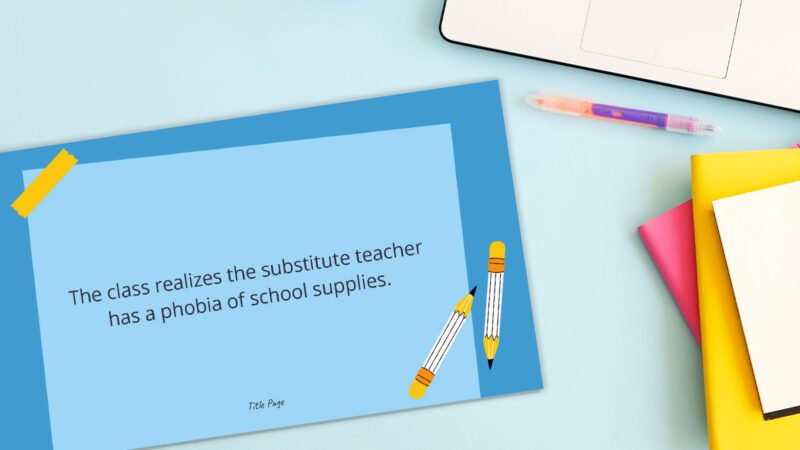
- The class realizes the substitute teacher has a phobia of school supplies.
- One day we woke up and all of the animals could talk.
- A class pet escapes, causing chaos as students scramble to capture it before the end of the day.
- You’ve accidentally created a clone of yourself while working on a science project.
- A student tries to impress their crush by concocting a love potion, but things don’t go as planned.
- Your best friend’s attempt to create the ultimate school project using only duct tape leads to unexpected challenges and mishaps.
- You were never the most popular kid in school, but when you realize the front office has confused you with the new foreign exchange student, you wonder how you could use this mix-up to your advantage.
- The teacher had to leave class due to an emergency and left you in charge. That was two weeks ago. The teacher never returned, and the principal hasn’t come in to check on you. How are things going?
- You’ve created a robot to help with your homework, but the robot’s interpretation of the assignments leads to chaos and you’ve got a lot of explaining to do.
- A school dance takes a hilarious turn when the DJ accidentally plays embarrassing music.
- Your best friend bets you $100 that you can’t make it an entire school day without telling a single lie.
- A group of students forms a secret society dedicated to pulling off epic pranks with increasingly elaborate schemes.
- A student’s attempt to impress their crush with a grand romantic gesture backfires spectacularly.
- Your imaginary friend never went away and pops up at unexpected times to ask you to play, but you are still the only one who can see them.
- You and your friends form a band to impress your crushes, despite having zero musical talent. But then your band goes viral.
- A science experiment goes awry, resulting in a classroom filled with bouncing slime creatures.
- Your best friend accidentally swaps bodies with their pet dog, leading to hilarious mix-ups and misunderstandings.
- A class project to create a time machine results in comedic chaos as students accidentally travel to different historical periods.
- Your best friend thought it would be a good idea to bring their pet to school. Spoiler alert: It wasn’t a good idea.
- A student discovers a secret portal in the school cafeteria that leads to a world filled with talking food.
Fantasy Short Story Ideas
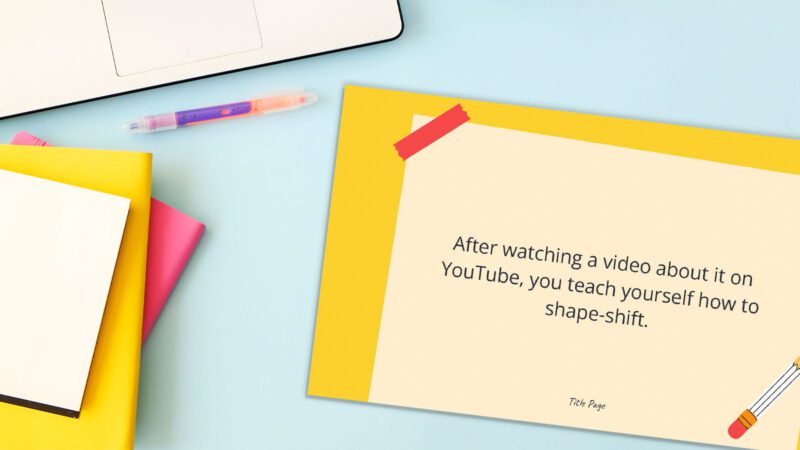
- After watching a video about it on YouTube, you teach yourself how to shape-shift.
- Rewrite your favorite fairy tale, but make it take place today in your town.
- A student discovers a hidden portal in the school library that leads to a magical realm filled with mythical creatures.
- You and your friends stumble upon a mysterious amulet that grants you extraordinary powers, but at a cost.
- During a field trip to an ancient castle, you uncover a long-lost treasure map that leads to a forgotten kingdom.
- You wake up one morning to find that you’ve been transformed into a mythical creature. Now you must embark on a quest to reverse the spell.
- A school talent show takes a magical turn when students showcase their abilities in elemental manipulation, telekinesis, and shape-shifting.
- You discover a forbidden book in the school library. It holds the key to unlocking powerful spells and incantations, but using its magic comes with dire consequences.
- During gym, students accidentally stumble upon a fairy kingdom hidden within the school grounds.
- A magical creature enrolls in the school, posing as a human student while trying to conceal their true identity.
- Your best friend finds a magical journal that allows them to rewrite reality, but each change comes with unforeseen consequences.
- You discover a hidden chamber beneath the school filled with enchanted objects and mysterious relics.
- Due to a magic spell gone wrong, the young wizard and the dragon have switched bodies. How well will the dragon do at pretending to be a human wizard? How will the wizard figure out how to be a dragon?
- On your birthday, someone gives you a ring. It allows you to control the weather.
- A game of Dungeons & Dragons takes on a life of its own when students find themselves transported into the fantasy world they were role-playing.
- A student inherits a magical heirloom passed down through generations of their family, unlocking its hidden powers.
- During a class project on mythology, students accidentally awaken ancient gods and goddesses who wreak havoc on the school.
- A student discovers they are the long-lost heir to the throne of a magical kingdom. They must go on a quest to reclaim their rightful place.
- An elf appears in your room one evening and informs you that your great-grandfather is the king of an elfin kingdom. He needs your help to defend the kingdom from evil invaders.
- You forgot your backpack and run back to get it, only to witness your teacher using magic to tidy up the classroom. She tells you that all teachers can secretly do magic.
Get Your Free Short Story Ideas and Prompts on Google Slides and a Printable Sheet
Just fill out the form on this page to get instant access to a Google Slide deck and a printable sheet featuring all of the short story ideas and prompts listed above.
Want even more classroom ideas? Be sure to subscribe to our newsletters!
You might also like.

19 Job Interview Red Flags That Kept Teachers From Working at Toxic Schools
"The school didn't know its own mission statement." Continue Reading
Copyright © 2024. All rights reserved. 5335 Gate Parkway, Jacksonville, FL 32256
The Straits Times
- International
- Print Edition
- news with benefits
- SPH Rewards
- STClassifieds
- Berita Harian
- Hardwarezone
- Shin Min Daily News
- Tamil Murasu
- The Business Times
- The New Paper
- Lianhe Zaobao
- Advertise with us
When it comes to financial advice, do your own homework
Updated guidelines impose stricter accountability on financial institutions. but can consumers rely solely on regulation for protection.
Chuin Ting Weber

An insurance application got denied because of autism. Mortgage or insurance policy terms were changed because of fine print. Someone was looking for a fixed deposit and ended up with an expensive insurance or investment product.
Happily, for consumers, the revised “MAS Guidelines on Fair Dealing – Board and Senior Management Responsibilities for Delivering Fair Dealing Outcomes to Customers” (guidelines) from May 30, 2024, will eliminate these obviously unfair practices.
Already a subscriber? Log in
Read the full story and more at $9.90/month
Get exclusive reports and insights with more than 500 subscriber-only articles every month
ST One Digital
$9.90 $9.90/month.
No contract
ST app access on 1 mobile device
Subscribe now
Unlock these benefits
All subscriber-only content on ST app and straitstimes.com
Easy access any time via ST app on 1 mobile device
E-paper with 2-week archive so you won't miss out on content that matters to you
Join ST's Telegram channel and get the latest breaking news delivered to you.
- MAS/Monetary Authority of Singapore
- Banks and financial institutions
Read 3 articles and stand to win rewards
Spin the wheel now

IMAGES
VIDEO
COMMENTS
Topics include: completing assignments, completing school work, how to start work by myself, and completing work independently. 6. Doing Homework Social Story from Meghan Brice on TPT - This story comes as a PowerPoint so you should be able to edit it. It uses a mix of photos and clipart. 7. Taking a Test Social Story from Mathnolia on TPT ...
Social Stories for Tests & Homework. An integral part of a student's education is ensuring comprehension of the subjects being taught. This is reinforced through the assignment of homework, and comprehension is assessed through exams and testing. Exams can be nerve wracking for students but there are ways you can help your child or students ...
Get personalized homework help for free — for real. Join for free. Brainly is the knowledge-sharing community where hundreds of millions of students and experts put their heads together to crack their toughest homework questions.
Get up and walk or stretch occasionally, or even do jumping jacks or run in place for a couple of minutes. Standing up while you work is also a great way to boost your focus. [1] Try sitting on an exercise ball or wobbly chair when you're doing your homework. The movement may help you stay focused.
Homework is a task we do at home to support our learning in school. Most schools expect their students to do some homework. ... Use the above examples to create your own personalised social story for the child. If you need to modify the language to support younger children ensure that the exact meaning intended remains clear and unambiguous ...
Story. "Charlieeeeeeee, do your homework now!" Wow, his mother was really bellowing at him. Charlie thought, "Well, she doesn't have to do it. It's so boring", and he spent hours with his books, hoping that time would pass and it would soon be time for supper. As usual, he was lying on his bed, busy staring at the ceiling, daydreaming.
Revise and Edit Your Story; After finishing the first draft, it's time to revise and edit. This step is about refining your story and making it the best it can be. ... Writing stories for your homework doesn't have to be an intimidating endeavor. By finding your inspiration, brainstorming ideas, creating an outline, drafting, and then ...
The Homework Struggle - A short story The Homework Struggle - A short story . First, "Finish your reading worksheets Neel", said mom. Next, "No", replied Neel curtly. Further, she said, "It is just two worksheets. It will take hardly twenty minutes", mom tried to reason out. Then, "Nooooooooooo", bellowed Neel.
Doing schoolwork and homework helps us to own the knowledge. My mom says that schoolwork teaches me responsibility and prepares me for being a grown-up. Grown-ups have jobs, and if they don't ...
This story felt so real to me. I'm in high school now, I took both the path of doing homework first and missing out on time with friends and also doing homework. The endings were fairly congruent with real life(At least for me) and this story was very personal for me. I enjoyed it very much, thank you.
6. Share the link to your digital homework space once with students at the beginning of the school year. Your students will have access to any of your recommended TED-Ed Lessons for the remainder of the school year. I gave my students a list of due dates for the entire school year so that students can plan ahead to complete the assignments. 7.
Here's how it works: first, set a timer for 25 minutes. This is going to be your work time. During this 25 minutes, all you can do is work on whatever homework assignment you have in front of you. No email, no text messaging, no phone calls—just homework. When that timer goes off, you get to take a 5 minute break.
Yes, and the stories we hear of kids being stressed out from too much homework—four or five hours of homework a night—are real. That's problematic for physical and mental health and overall well-being. But the research shows that higher-income students get a lot more homework than lower-income kids.
Finding Meaning In Work. People who are passionate about what they're doing, and present in it are attractive. to go back to the top. Designed to help you achieve a productive and fulfilling life at home and work. A collection of helpful content to inspire thought and action.
A TIME cover in 1999 read: "Too much homework! How it's hurting our kids, and what parents should do about it.". The accompanying story noted that the launch of Sputnik in 1957 led to a push ...
2. Eliminate as many distractions as possible. Put your phone away, get away from your computer, and make your environment as quiet as possible. Giving homework your undivided attention will actually make it easier, because your mind won't be balancing different tasks at the same time.
Download Article. 1. Ask your parents or peers for help. Parent involvement in homework has been shown to help with homework completion and improved academic performance. [15] Asking a friend for help in understanding a concept or an assignment can go a long way in helping you complete your homework on time. [16] 2.
Last week, we brought you the story of how the phrase "The Dog Ate My Homework" came to be and how it morphed into a palpably ridiculous excuse. Turns out, sometimes its not an excuse at all ...
Miya Kofo is a 16-year-old high school student with ADHD — and the star of Understood's "Be the Reason" campaign to fight stigma around learning and thinking differences. Miya was diagnosed in middle school. Her dad, who also has ADHD, helped her see it was nothing to be ashamed of and that she could accomplish anything.
Some of the most popular summer homework projects involve story writing. The Guardian Teacher Network has resources to help students of all ages to write stories at home over the summer or next term.
One teacher proposed "homework" consisting of after-school "field trips to the woods, factories, museums, libraries, art galleries.". In 1937, Carleton Washburne, an influential educator who was the superintendent of the Winnetka, Illinois, schools, proposed a homework regimen of "cooking and sewing…meal planning…budgeting, home ...
For older students, Kang says, homework benefits plateau at about two hours per night. "Most students, especially at these high achieving schools, they're doing a minimum of three hours, and it's ...
Free I Can Do My Homework Social Story: Girls Version: Pages 10. I have been creating a large selection of free social stories on school skills. Many of our children have difficulty with transition from ABA programs to school. Niam , my son who has autism , had many difficulties with transition. This social stories and others in the school ...
Homework For Life is Matt's strategy for capturing and using the meaningful moments in his life on a daily basis. he shares the technique of recording these ...
The psychological benefits of completing homework on time are profound and multifaceted. From enhanced time management and reduced stress to improved self-esteem and better sleep patterns, the ...
Get your free PowerPoint or Google Slides bundle by submitting your email here. Suspenseful Short Story Ideas We Are Teachers. The tombstones in the town's cemetery are going missing. ... You've created a robot to help with your homework, but the robot's interpretation of the assignments leads to chaos and you've got a lot of explaining ...
Making a weekly plan for when you'll do your homework will help you to make sure it's all completed by the time it's due in. First, you'll need to work out which days and times are going ...
Ariel Villarreal told Newsweek the "moral of the story is check your kids' homework and work with them one-on-one". More for You Hollywood Giants: 25 Tallest Actors in Showbiz
At a minimum, we need to be more aware of our own biases, like greed and fear; and do some homework so we ask the right questions. PHOTO: PEXELS
The inventor of homework may be unknown, but its evolution reflects contributions from educators, philosophers, and students. Homework reinforces learning, fosters discipline, and prepares students for the future, spanning from ancient civilizations to modern education. Ongoing debates probe its balance, efficacy, equity, and accessibility, prompting innovative alternatives like project-based ...